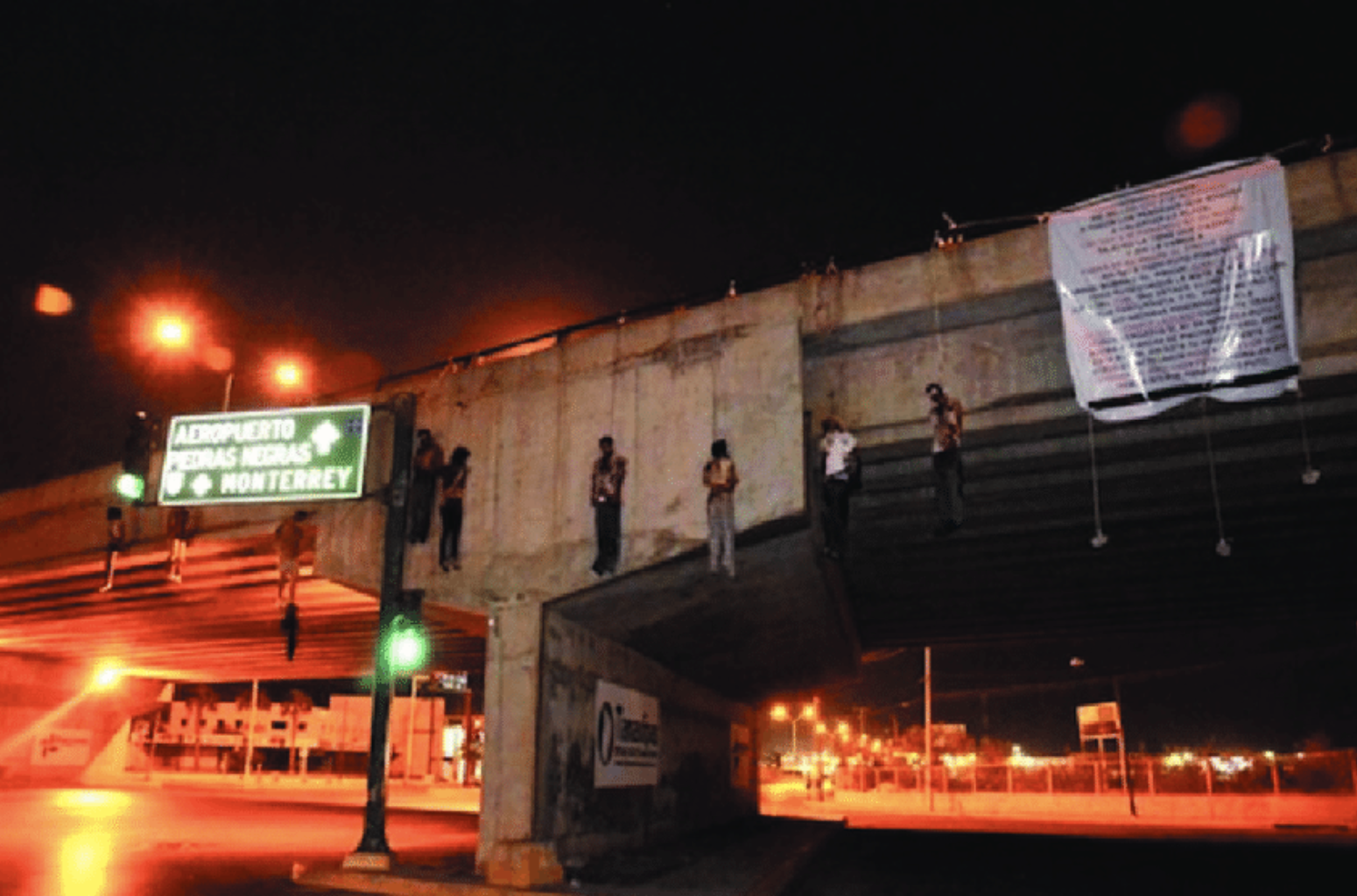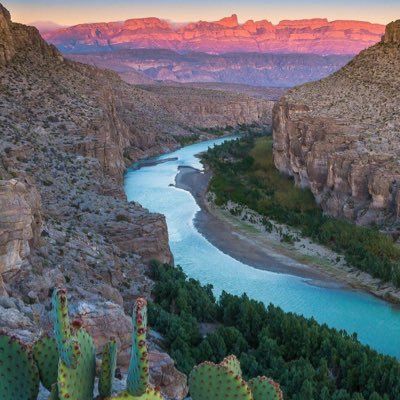Preface
In 1980, the U.S. Department of Energy published a paper on the implications of Mexico's energy resources for U.S. policy in the 1980s and beyond. The authors assessed that Mexico would be one of the world's major sources of oil and natural gas, exceeded only by the U.S., the Soviet Union, Saudi Arabia, Iran and possibly Iraq and Kuwait, and acknowledged that Mexico's resources were critical for meeting U.S. energy needs

In 1985 during the Reagan administration, the United States Geological Survey published the results of fieldwork surveying the natural hydrocarbon resources in northeastern Mexico. The survey concluded that "giant" natural gas, coal and oil deposits were present in the Burgos and Sabinas basins in Coahuila, Nuevo León and Tamaulipas.

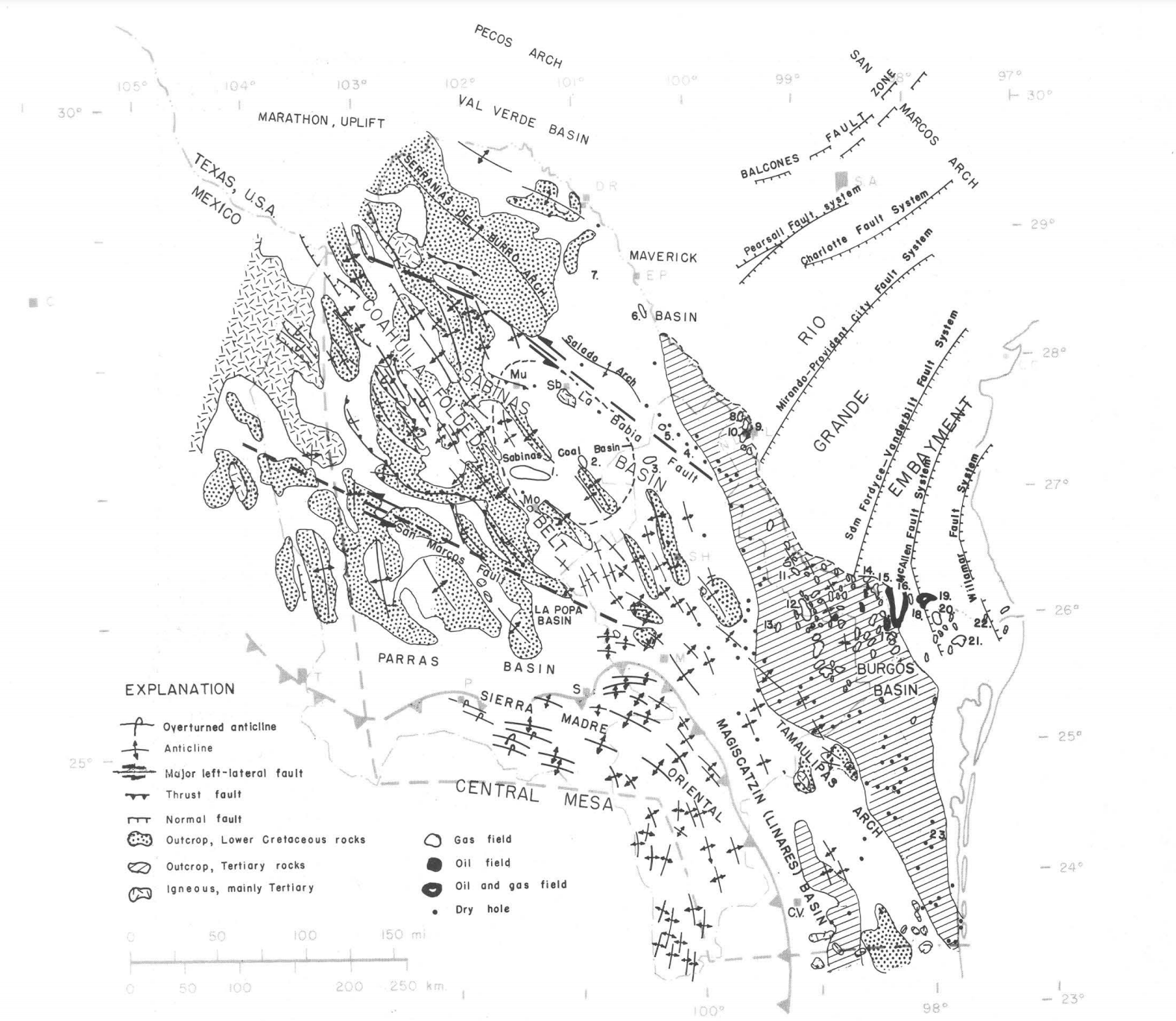
In 1986, President Reagan issued National Security Decision Directive Number 221, which identified the international drug trade as a threat to the national security of the United States.
In the final months of the Reagan administration, Congress passed the U.S. Anti-Drug Abuse Act of 1988, which prescribed military support for countering transnational crime and drug trafficking for the first time.
While the U.S. War on Drugs grew increasingly militarized, Mexico began to embrace neoliberal reforms. Negotiations between Mexican President Carlos Salinas de Gortari and President George H.W. Bush began in 1988 over what eventually became the North American Free Trade Agreement (NAFTA).
After NAFTA took effect in 1994, a small war between the Zapatista National Liberation Army and the Mexican state broke out in Chiapas. In response to the unrest, Mexico sent their Airborne Special Forces Group (GAFE) to crush the rebellion.
Between 1996 and 1999, 3,200 Mexican soldiers, including at least 500 GAFEs, were reportedly trained by the U.S. military and special forces in counternarcotics for fighting on behalf of the post-Cold War U.S. national security agenda.
In what is often framed as an ironic consequence of the corrupting influence of organized crime, the training from the U.S. and Mexican special forces diffused into the service of one of Mexico’s oldest drug trafficking organizations, the Gulf cartel.
In 1997, Arturo Guzmán Decena, better known by the alias “El Zeta-uno” (Z-1), defected along with other Mexican special operations forces to work for Gulf cartel boss Osiel Cárdenas Guillén in Tamaulipas.
Trained and experienced in counterinsurgency and unconventional warfare before being repurposed supposedly to fight drug-trafficking, former GAFEs would become one of the most infamous and brutal drug-trafficking organizations in history: Los Zetas.
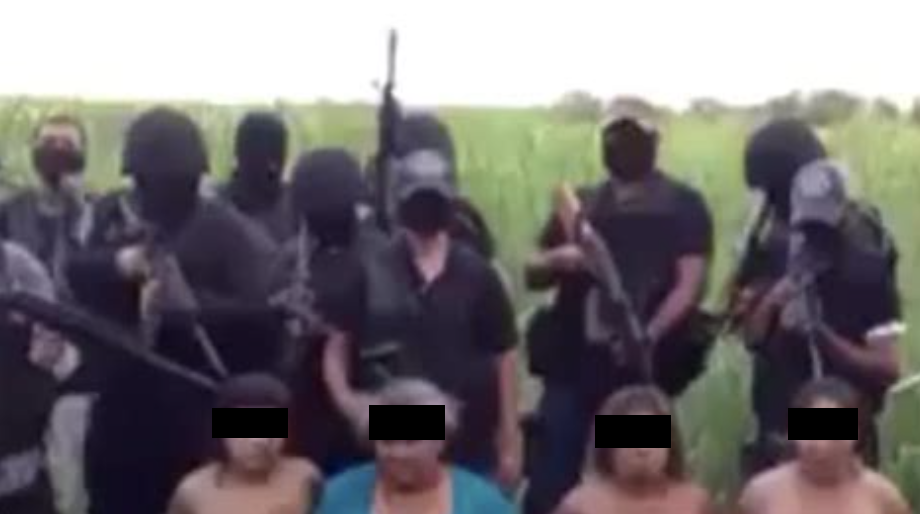
The Zetas’ introduced paramilitarism and new extremes of violence into the criminal underworld in Mexico, which was used to justify President Felipe Calderón’s (2006-2012) decision to deploy the military against the civilian population in his first month in office.
That decision started a war that has claimed over 400,000 lives with no end in sight, a war in which the only apparent victors are extractive industries that exist in harmony with violent conflicts fought in the shadows across the world.
"…an endless trail of corruption"
Mexico’s 2014 constitutional reform ended the state-owned Petroleos Mexicanos (PEMEX) monopoly on their national energy industry and was purchased through bribery of presidents, presidential candidates and legislators, along with encouragement from the U.S. State Department under former Secretary Hillary Clinton. Bribes were paid to officials all over Latin America through a sophisticated network of shell companies and offshore accounts which were revealed in what became the Odebrecht bribery scandal.
The Brazilian construction and engineering firm Odebrecht operated as a conduit for dark money from all over the world seeking to purchase influence in Latin America. According to a 2016 U.S. federal indictment, Odebrecht even had a dedicated bribery department called the Division of Structured Operations.
In Mexico, the Odebrecht bribery scandal led to the arrest of former president of PEMEX Emilio Lozoya in 2019. In 2020, Lozoya was extradited to Mexico to face charges related to bribery, money laundering and other criminal activity.
The Lozoya case has rocked the political establishment in Mexico with testimony implicating, among others, former Presidents Felipe Calderón and Enrique Peña Nieto, and Peña Nieto's campaign manager Luis Videgaray, who allegely orchestrated bribes to legislators in exchange for energy reform as a part of the 2012 Pact for Mexico, which the Wall Street Journal described at the time as, "How Mexico Ended Political Gridlock."
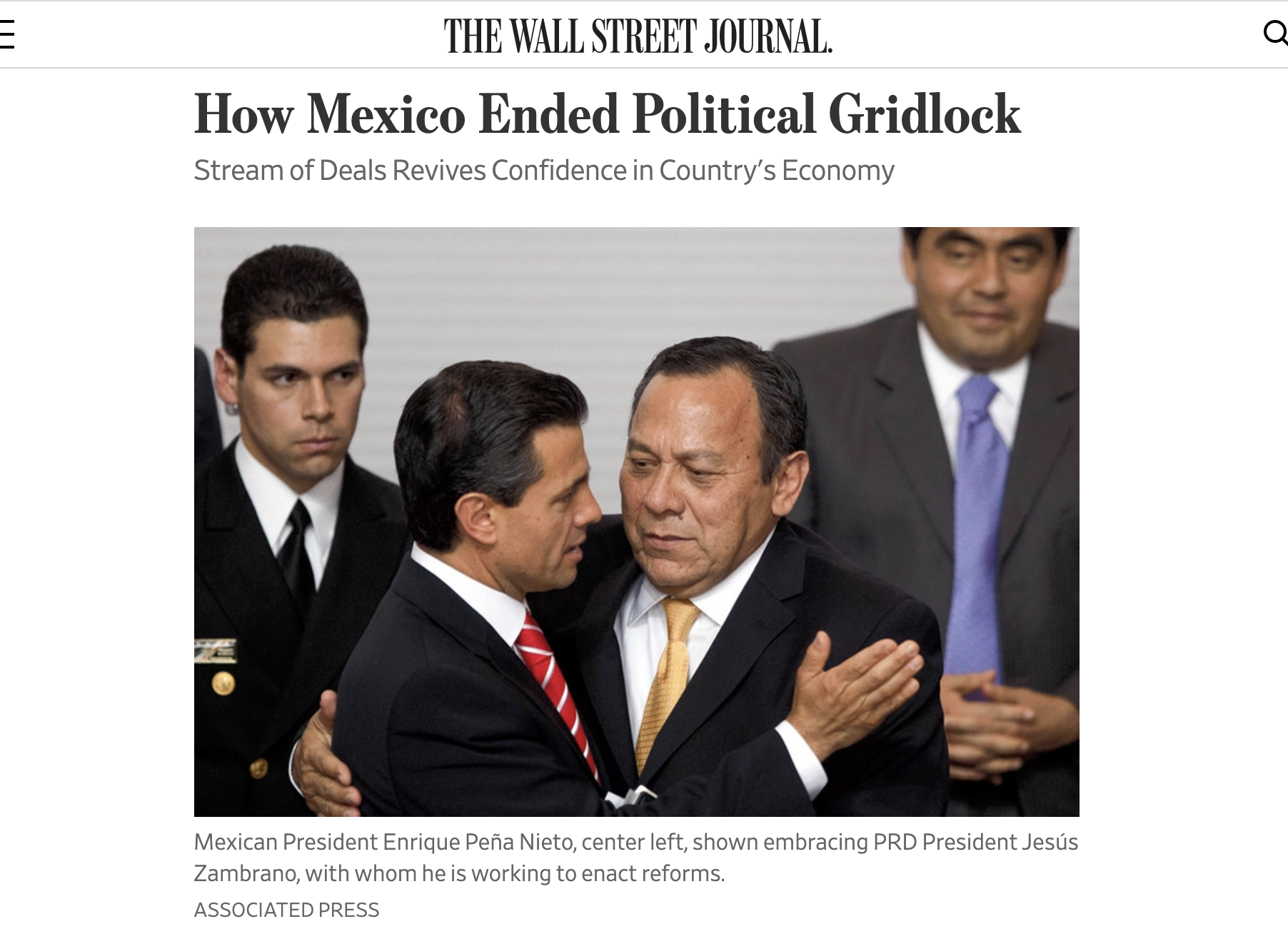
One of the legislators named in Lozoya's testimony for allegedly accepting bribes in exchange for energy reform was the former Nation Action Party (PAN) senator and current governor of Tamaulipas, Francisco García Cabeza de Vaca.
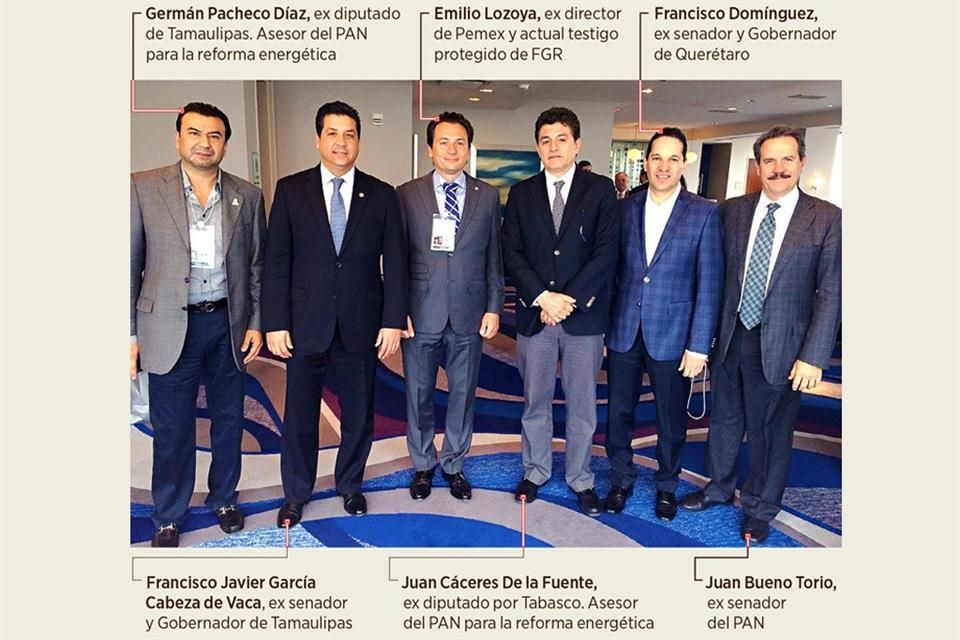
Cabeza de Vaca was instrumental in the initiative to open Mexico’s energy resources to foreign companies as a member of the Senate Energy Commission and one of the main proponents of the constitutional reform bill.
In a 2013 speech, then-Senator Cabeza de Vaca elaborated his views on energy reform:
“Mexico is facing a great opportunity. The development of gas and oil in shale deposits, also known as shale-gas and shale-oil, which forces us to rethink the organization of the national energy sector in an urgent and radical way, taking into consideration that our northern neighbor, the United States, their development has been very rapid and successful, which has allowed them to increase their hydrocarbon reserves and production.
The existence of a large number of similar deposits in Mexico, particularly in the northern states of the country, such as Coahuila, northern Veracruz, Nuevo León and Tamaulipas, that we estimate exceeds PEMEX’s current operating capacity and investment potential.
[…]
My party, the National Action Party, has upheld the principles of free market economics with social responsibility, since we are convinced that it is the most efficient economic system and the one that offers the most opportunities for growth to the country and to the families of Mexicans.
We believe that monopolies are inefficient by nature, and generate, as we have seen time and again, an endless trail of corruption.”
Priorities
In 2007, the year after Felipe Calderón sent the military to fight drug trafficking in Mexico, Texas Governor Rick Perry appointed Fred Burton to the head of the Border Security Council.
A former member of the U.S. State Department's Diplomatic Security Service, Burton worked for the private intelligence firm Stratfor, described by some as a private Central Intelligence Agency (CIA) for corporate clients, and by others as "The Economist [magazine] a week later and several hundred times more expensive."
The Border Security Council (BSC) was a lobbying group in Texas that used discretionary funds from the U.S. Department of Homeland Security (DHS), including for the protection of U.S. food supplies, to come up with policy recommendations for addressing the supposed threat of drug cartels in Texas despite little evidence of cartel-related violence in the state.
In 2011, following the advice of the BSC, Texas agriculture secretary Todd Staples commissioned a report, "Texas Border Security: A Strategic Military Assessment", from former Generals Barry McAffrey (U.S. Army, retired) and Robert Scales (U.S. Army, retired). According to reporting from Melissa del Bosque:
McCaffrey had served as commander of U.S. troops in Central and South America in the early 1990s as the war in Guatemala was winding down. He later served as drug czar under President Bill Clinton. In 2003, Scales co-founded a private defense-consulting firm called Colgen Inc. In 2008, The New York Times revealed that Scales had been part of a covert group of retired military officials advocating in the media on behalf of the Bush administration for the invasion of Iraq.
The Texas Border Security assessment recommended a list of policies for securing the Texas Border, including:
• creating fusion centers to facilitate intelligence sharing between law enforcement and intelligence agencies
• facilitating partnerships between U.S. and Mexican law enforcement
• designating cartels as foreign terrorist organizations
A New Way Forward
U.S. Customs & Border Patrol (CBP, part of DHS) has historically worked in the shadow of their counterparts at more prestigious federal law enforcement agencies like the DEA and the FBI. One of the reasons for that is because CBP has had more cases of corruption than all the other federal law enforcement agencies combined.
One of the worst cases of corruption yet documented happened in 2015, when a CBP agent linked to the Gulf cartel was charged in a beheading murder near McAllen, Texas. The agent was found to be in possession of more than a kilo of cocaine at the time of his arrest.
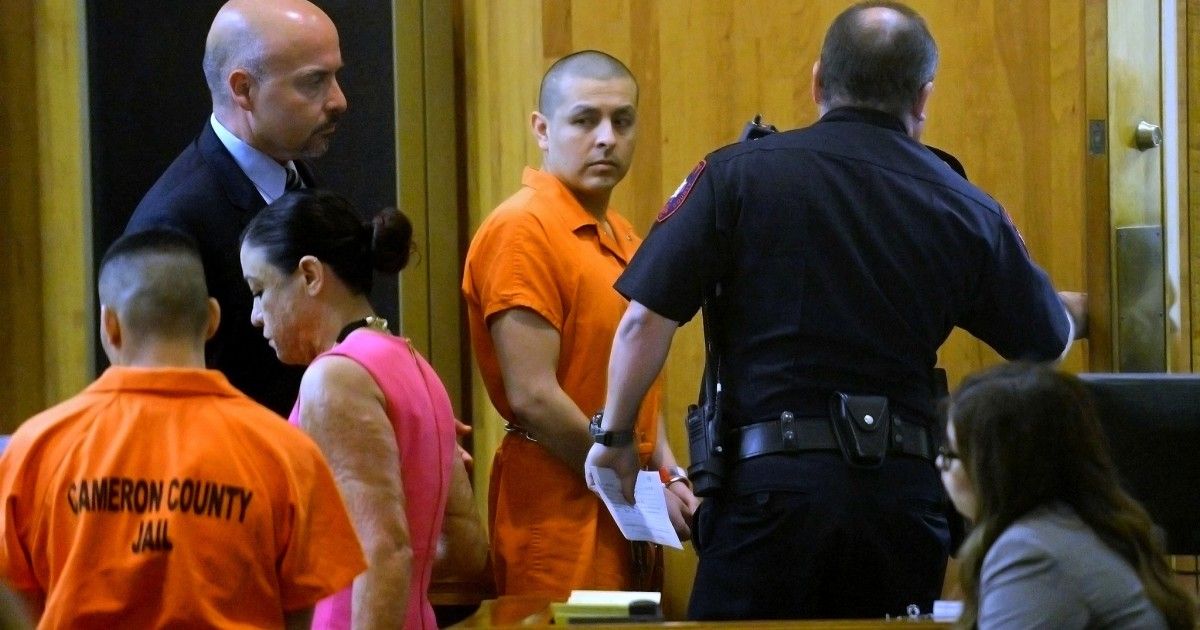
CBP has struggled for years to get the same respect, privileges and access that their counterparts in other federal law enforcement agencies have. In January of 2020, they were finally designated as a security agency.
One of the biggest challenges for CBP and other law enforcement agencies along the border has been Posse Comitatus statutes, which forbid the DoD and its subordinate agencies like the National Security Agency (NSA) and the National Geospatial-Intelligence Agency (NGA) from sharing intelligence for use by law enforcement, with a few exceptions.
One notable exception is the El Paso Intelligence Center (EPIC), one of the first fusion centers combining assets from various law enforcement and intelligence agencies for a collaborative counternarcotics mission.
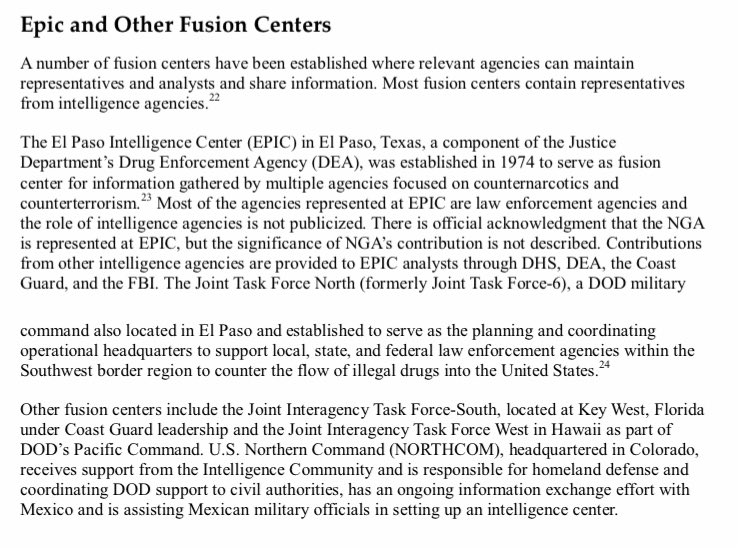
The number of fusion centers in the U.S. dramatically increased after 9/11 and the creation of the Department of Homeland Security (DHS).
Critics of fusion centers have warned about their potential for mission creep, or the gradual expansion of a mission beyond its original mandate, such as when a multi-agency counternarcotics mission evolves to justify using DoD capabilities for counterterrorism.
On November 20, 2014, a directive in the Southern Border and Approaches Campaign established a new multi-agency partnership, Joint Task Force-West (JTF-West), that would be responsible for securing the southern land border from the supposed threats of terrorism, illegal migration and contraband trafficking. The campaign was announced by DHS Secretary Jeh Johnson only days after the 2014 midterm elections, in which the GOP took the Senate and held on to the House of Representatives.
The U.S. presidential race truly begins after the midterms, and Texas Senator and 9/11 masturbator Ted Cruz was seen by many as the frontrunner heading into the Republican primaries. Before Donald Trump entered the race, Cruz seemed to have everything needed to take the nomination, including support starting in early 2014 from Steve Bannon, then-manager of a publication influential with the conservative base, Breitbart News.
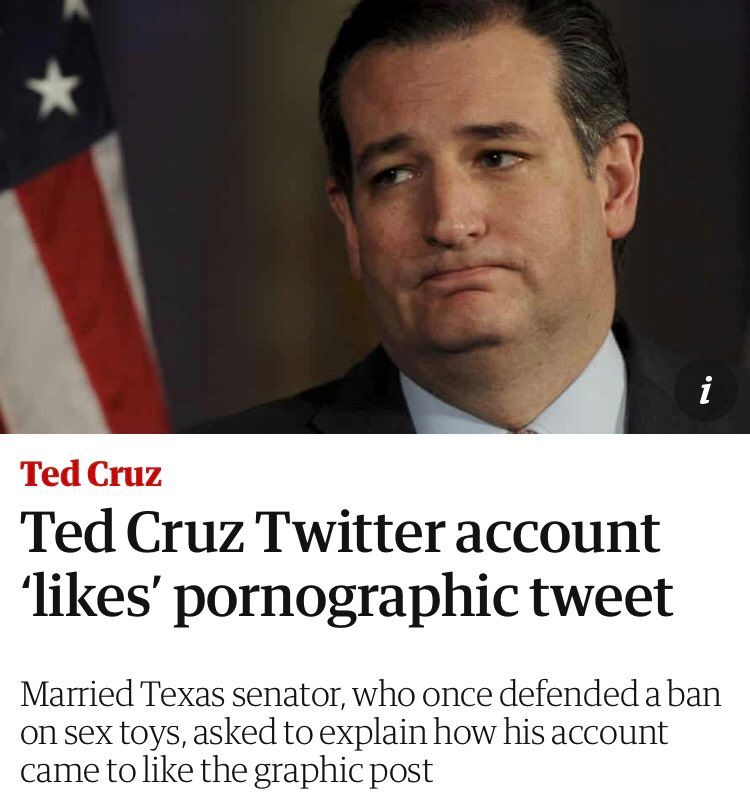
Although he ultimately went on to endorse and later work for the Trump campaign, Bannon supported Ted Cruz earlier in the race.
According to a 2016 story in The Hill, Cruz initially had Bannon's support and received favorable coverage from Breitbart starting in early 2014. One source quoted in the story said that although Bannon stopped short of formally endorsing Cruz, "he made it clear that Cruz was his guy."
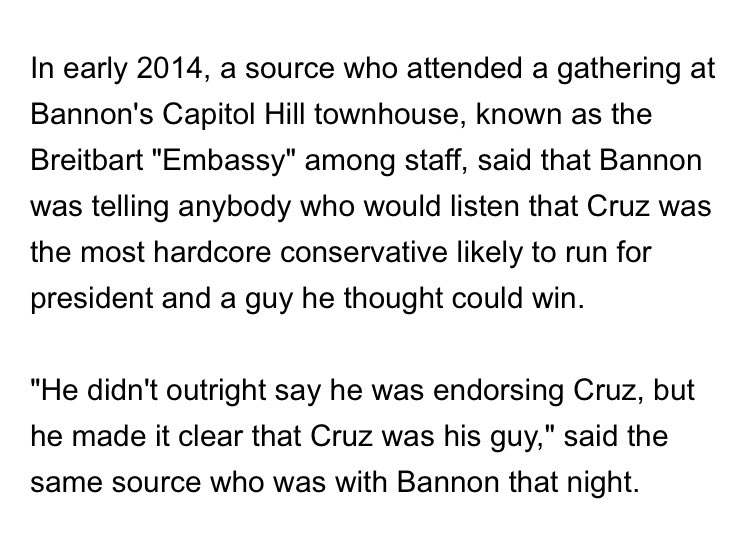
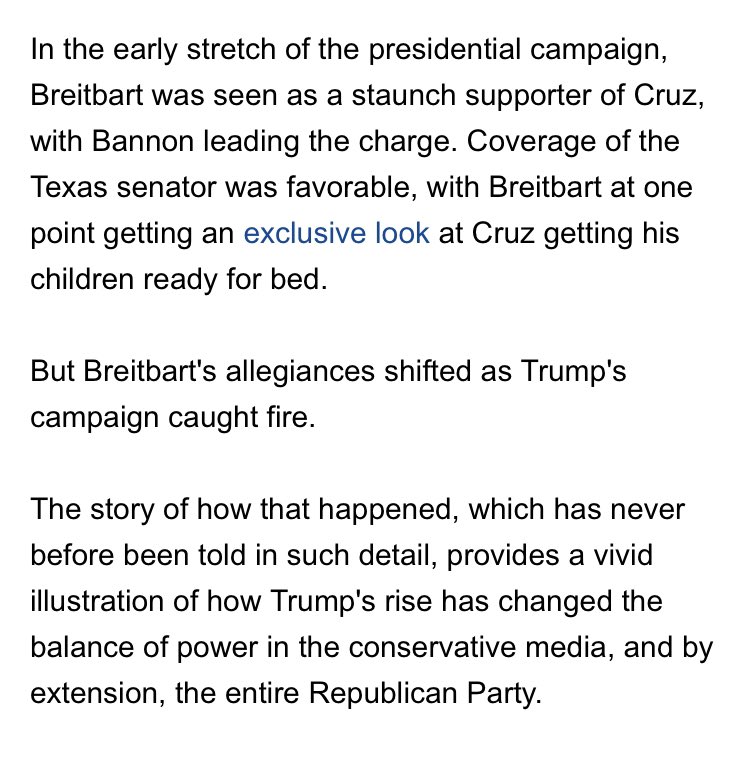
Cruz also received support until the bitter end of his GOP primary campaign from Nelson Balido, an energy and border-industrial complex lobbyist, who wrote several gushing opinion pieces for the Fox New website on why Cruz was the best candidate for the GOP to take the presidency in 2016.
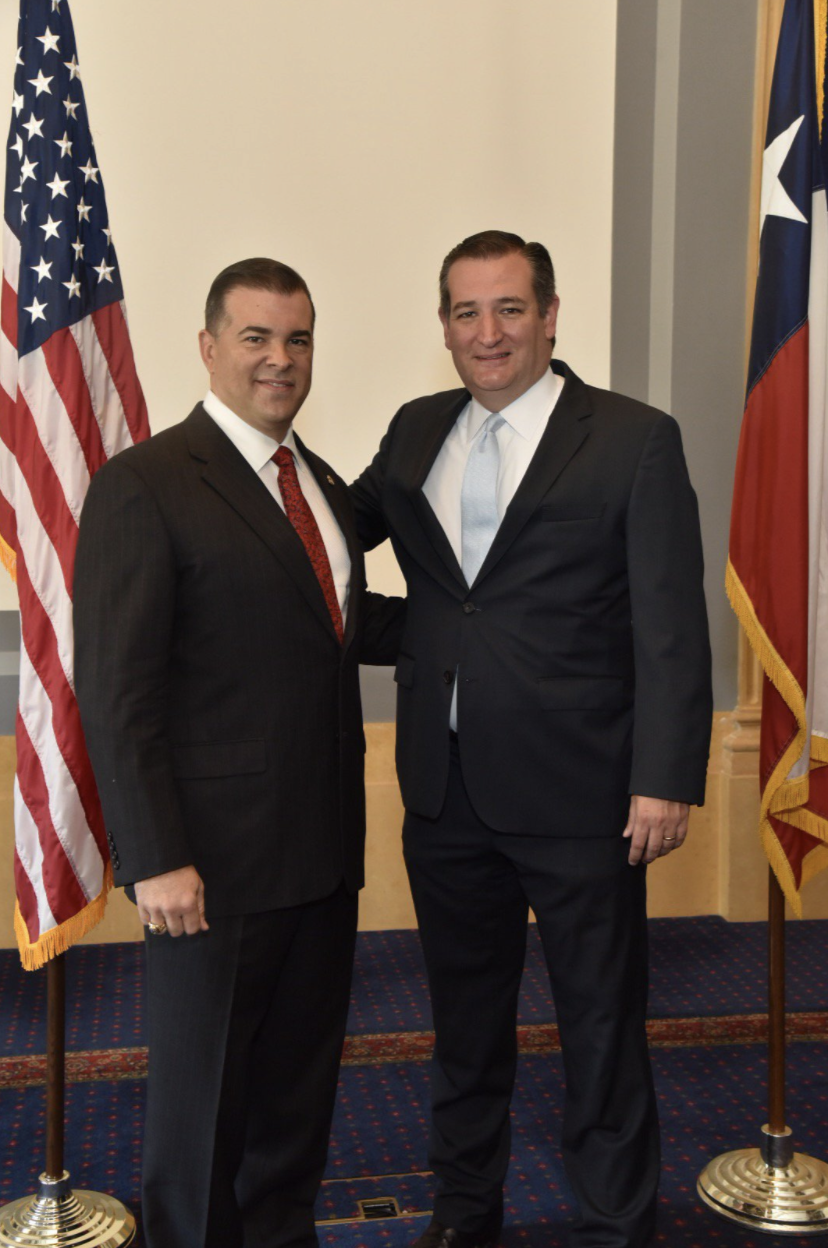
Someone else connected to Cruz worth mentioning is Joseph Wade Miller. Until he was hired as chief of staff for U.S. Congressman Chip Roy of Texas, Miller was Ted Cruz's chief political strategist until 2018.
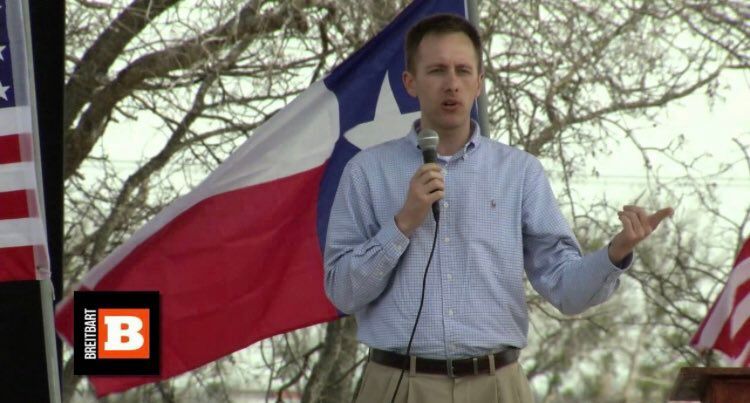
The GOP nomination and the 2016 presidential election ultimately went to Donald Trump.
In December of 2016, CBP published a press release about the new direction for JTF-West, that would combine "seven federal law enforcement agencies’ efforts into one singular, coordinated strategy" in order to "identify, prioritize, and target the top criminal organizations impacting national security, border security and public safety."
Through JTF-West, CBP expanded their authority, autonomy and capabilities under the pretext of combatting the evolving threat to national security, according to them, posed by illegal immigration and drug and human trafficking organizations. Whereas before, CBP was somewhat of a pariah within federal law enforcement, the 2016 U.S. election effectively marked the beginning of "A New Way Forward," in which JTF-West would be "a key player in relations with Mexico by contributing to discussions between the two governments to improve security on both sides of the border."
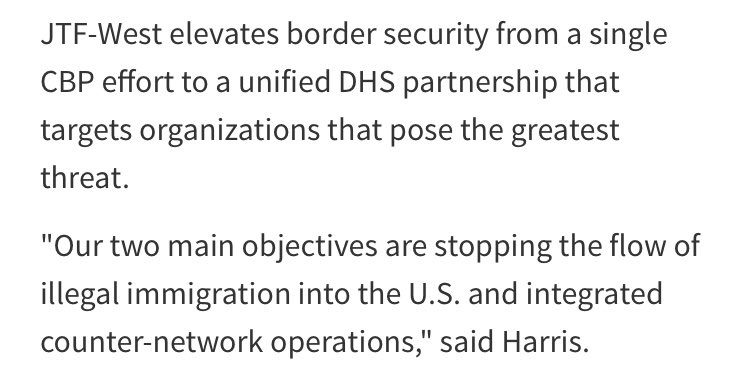
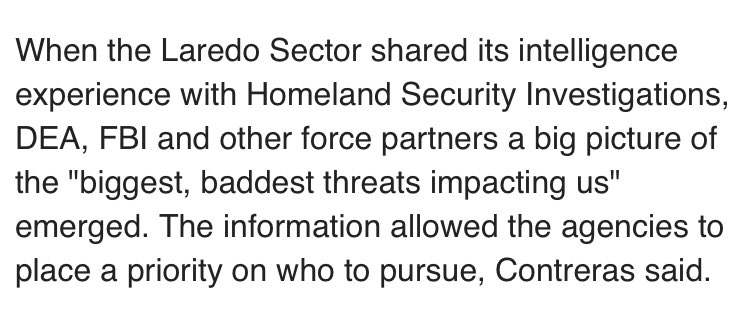
Security and prosperity
Although not all of Mexico's politicians and police are corrupt, official corruption is widespread and persistent. Inadequate training, low salaries, lack of accountability mechanisms and bad political leadership contribute to the problem within law enforcement, and many politicians use public office to enrich themselves and their associates.
Tamaulipas, which abuts the Texas border from Brownsville to Laredo, has had an especially bad problem with official corruption, with each of the last four governors (including the current one) facing criminal proceedings of some kind in the U.S. or Mexico, which brings us back to Governor Francisco García Cabeza de Vaca.
Cabeza de Vaca has a long history of reported ties to organized crime starting with his arrest in high school for stealing guns out of parked vehicles in Texas.
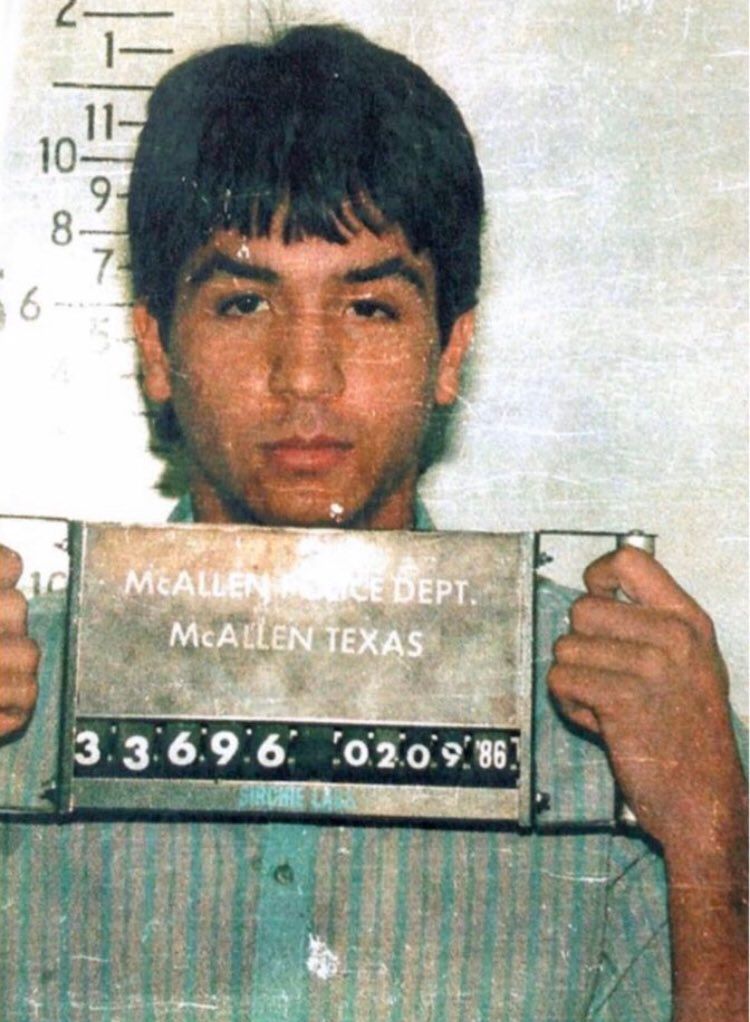
According to testimony from Antonio Peña Argüelles, a money launderer for the Zetas drug cartel and protected witness for the Drug Enforcement Administration (DEA) in a federal case in the Western District of Texas, Cabeza de Vaca has been compromised by organized crime since at least 2004 when he accepted $500,000 from the Gulf cartel for his campaign for mayor of Reynosa in exchange for official favor for the cartel.
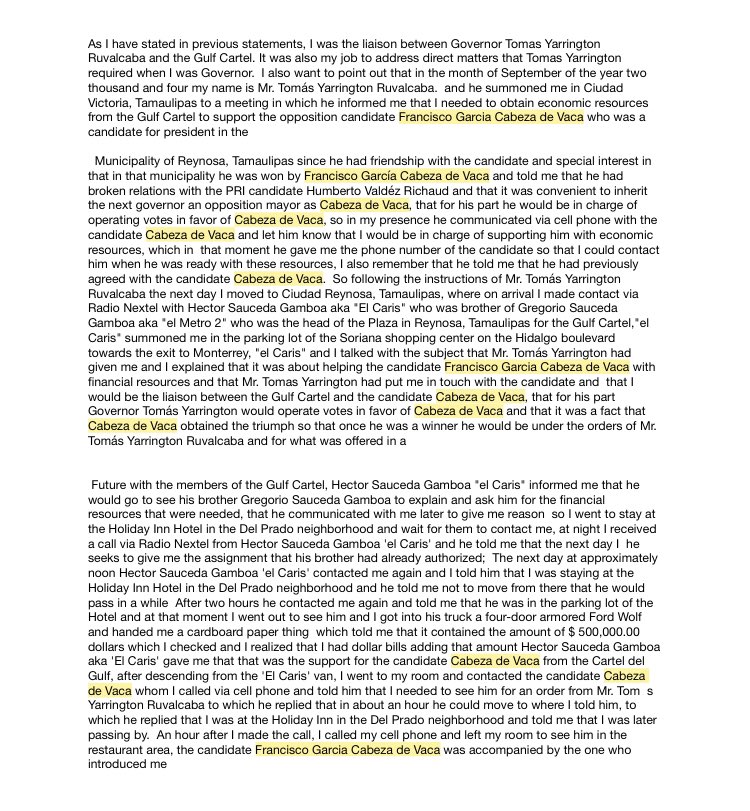
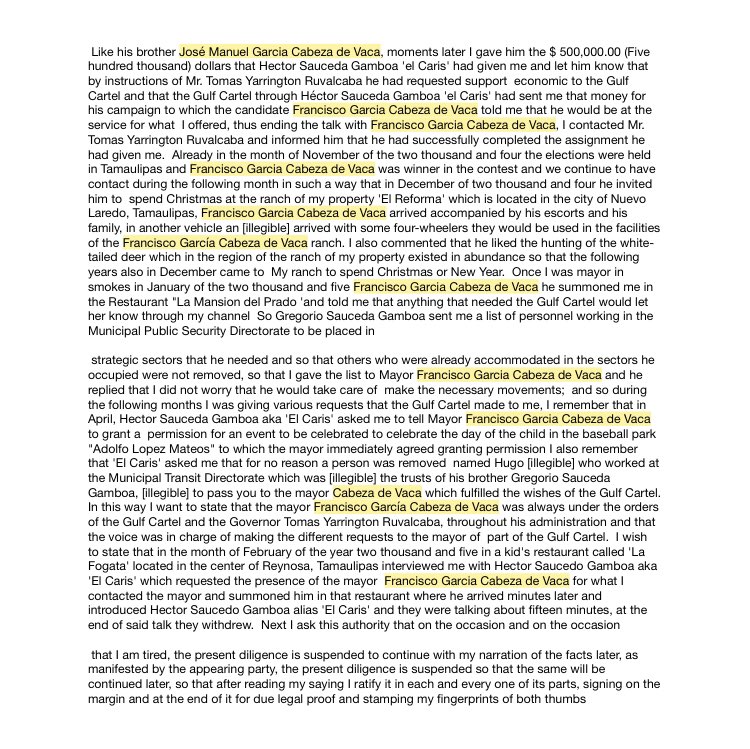
Although you would never know it from reading Breitbart's Cartel Chronicles, even though the corrupt Mexican politician is one of their favorite narratives. According to Breitbart, Cabeza de Vaca is standing up to the cartels.
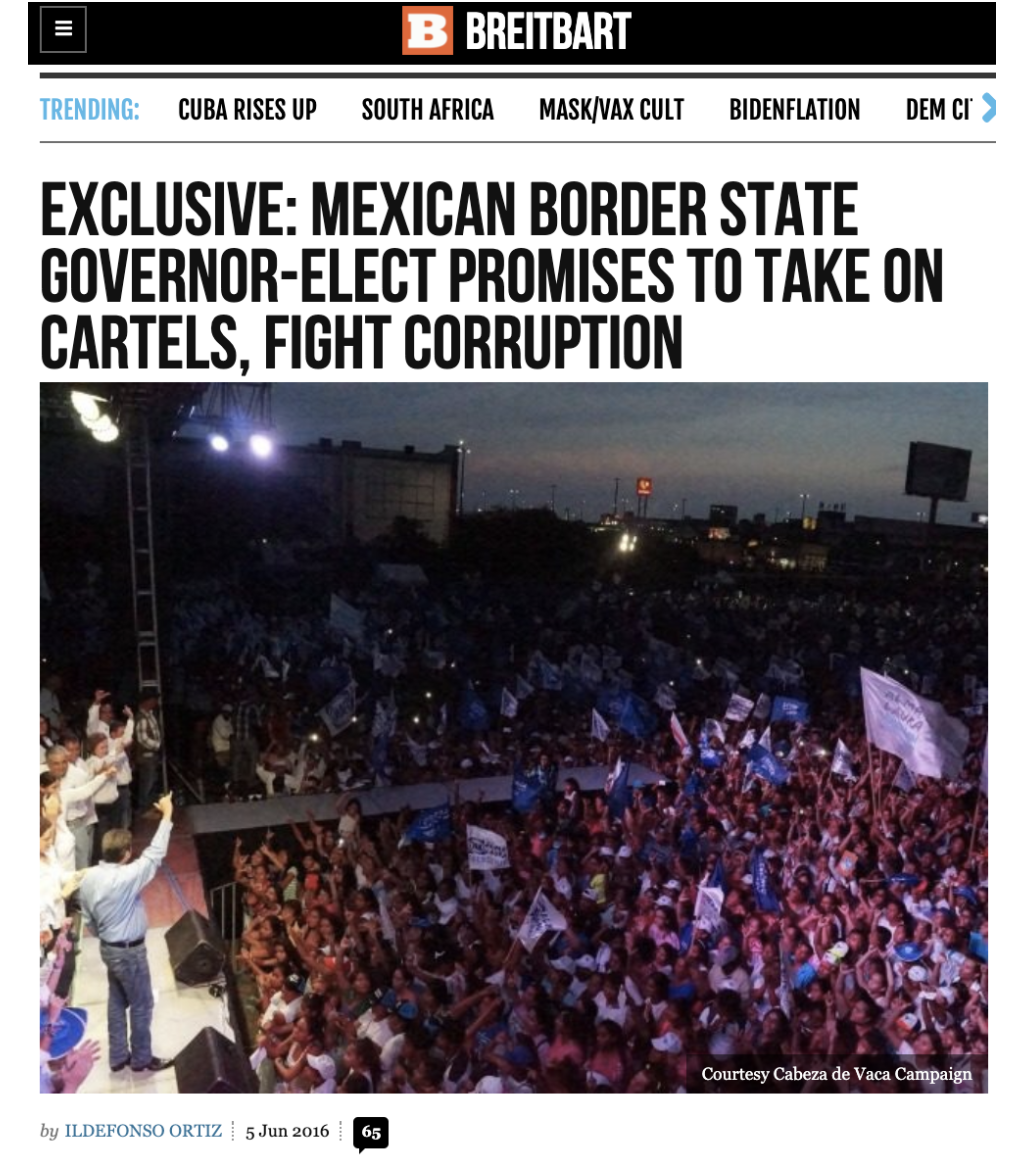
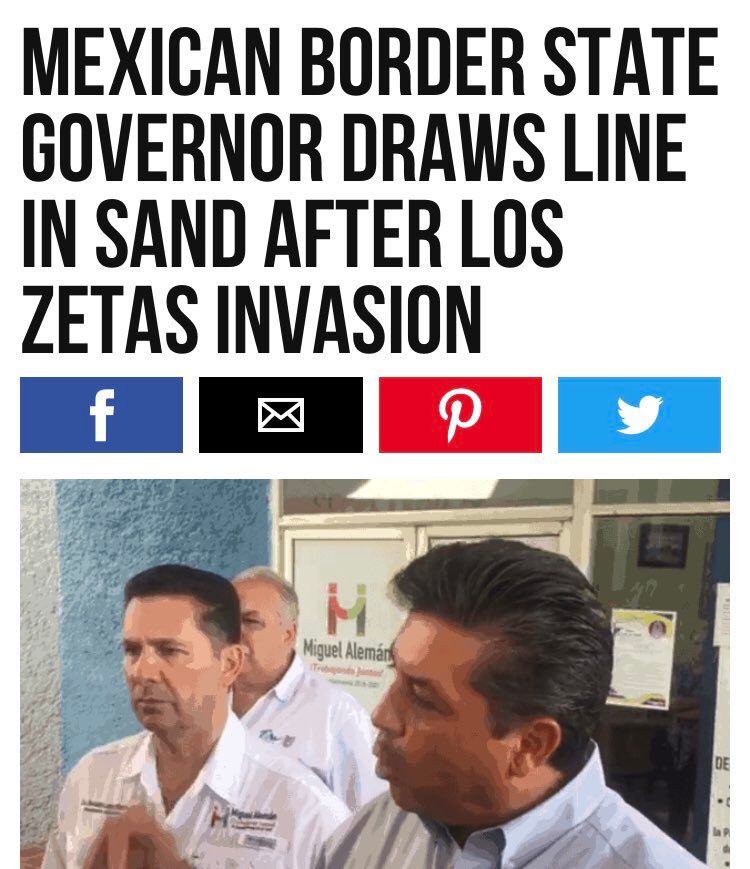
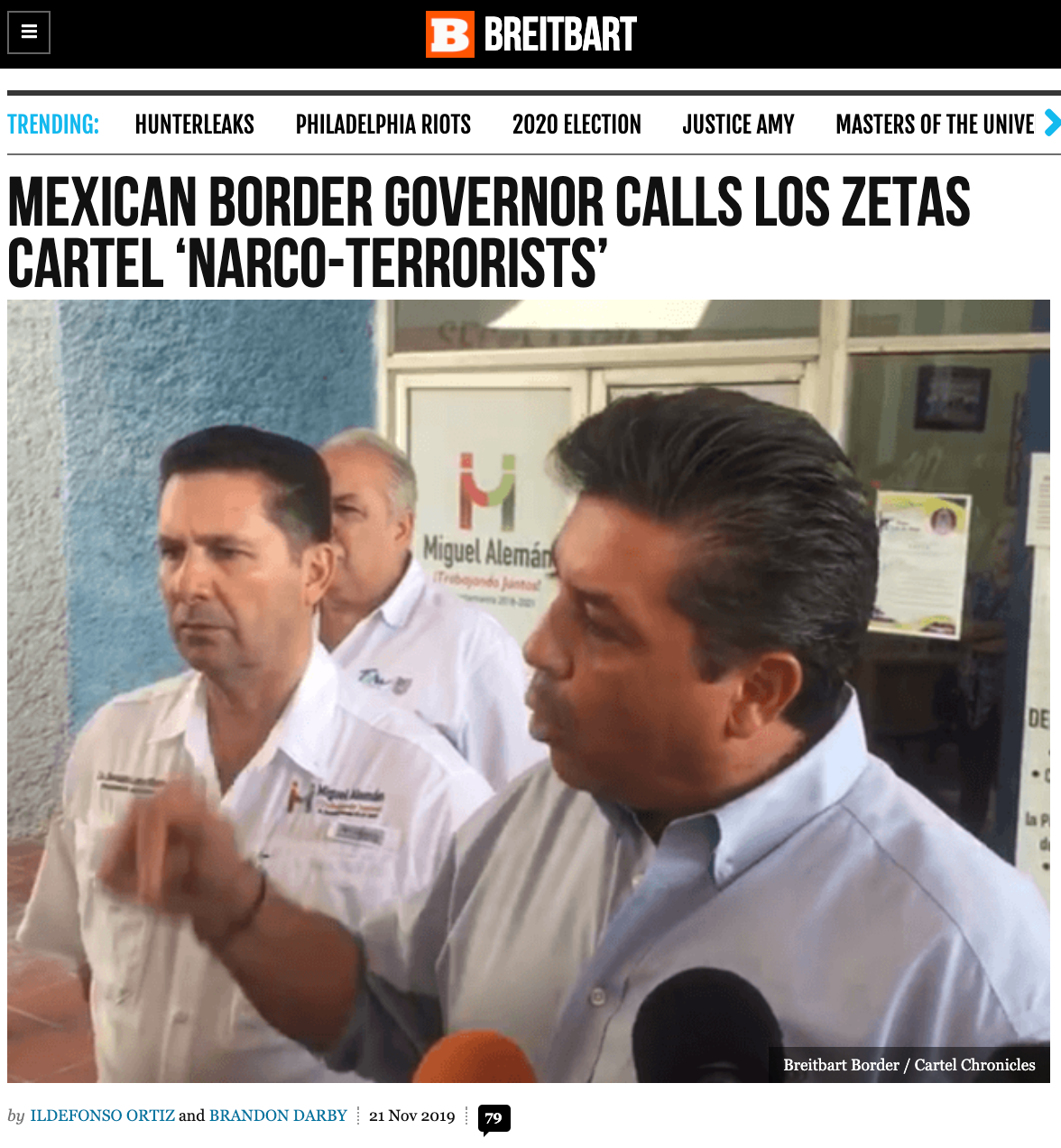
Nor would you see anything but praise for Cabeza de Vaca on the Fox News website, like in this editorial from Nelson Balido, perhaps the single most important character in this story.

According to his CV, Balido completed graduate studies from 2005 to 2007 in International Affairs at the George Bush School of Government at Texas A&M University, home to the Presidential Library of George H. W. Bush.
Balido's current titles include Chairman of the Border Commerce and Security Council (a lobbying firm representing defense and construction contractors), Lieutenant Commander in Public Affairs with U.S. Southern Command (USSOUTHCOM), Consultant to the Undersecretary of Intelligence and Analysis at DHS, and US-Mexico Energy Relations Advisor.
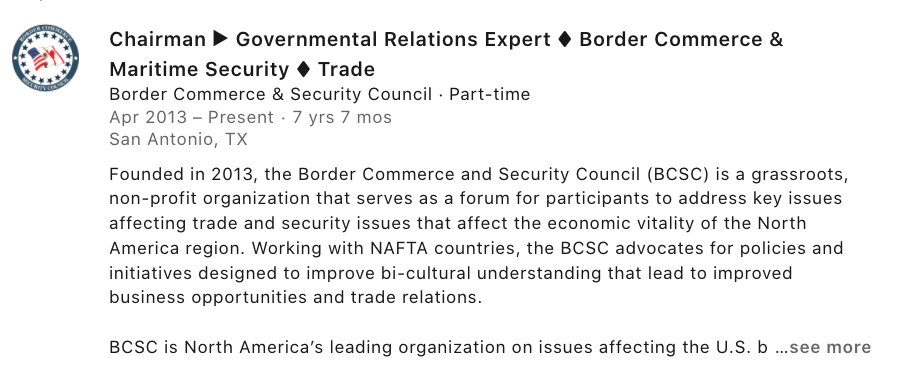
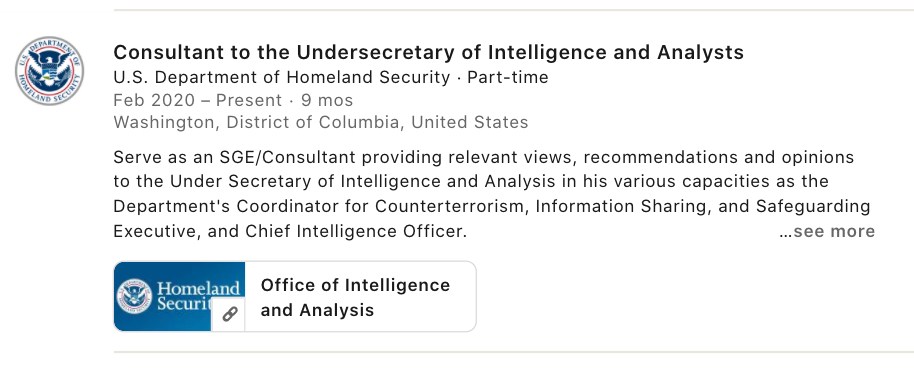
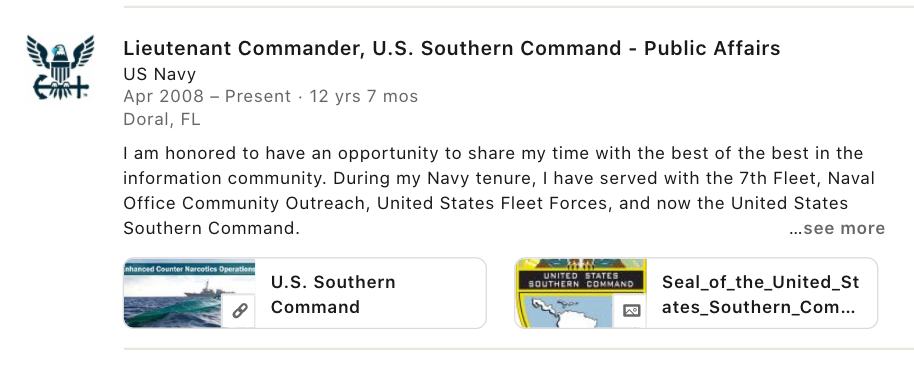
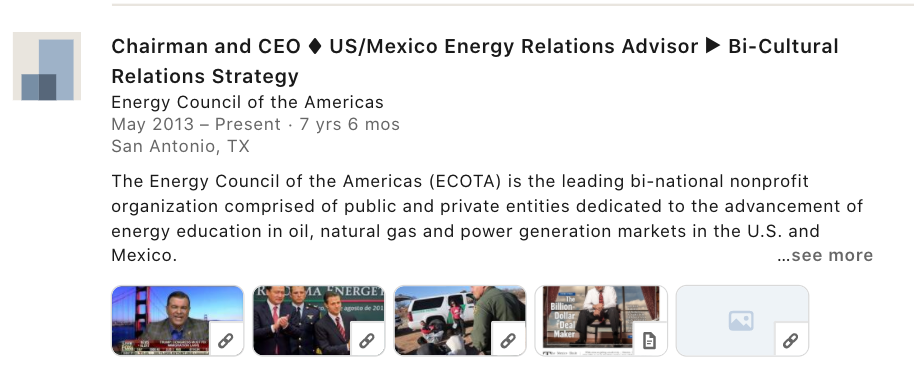
According to Balido's May 2016 column, Cabeza de Vaca—mentioned 26 times in alleged criminal conspiracies in the Peña Argüelles' testimony—was "clean as a whistle." According to Balido:
I can write with certainty that claims about Cabeza de Vaca being a 'narco senator' are completely baseless. He is as clean as a whistle. This conclusion is supported by the logical deduction that if Cabeza de Vaca had dealings with criminal organizations, he would not be able to travel as freely as he does in the United States, far more so than previous Tamaulipas governors who are wanted by U.S. law enforcement.
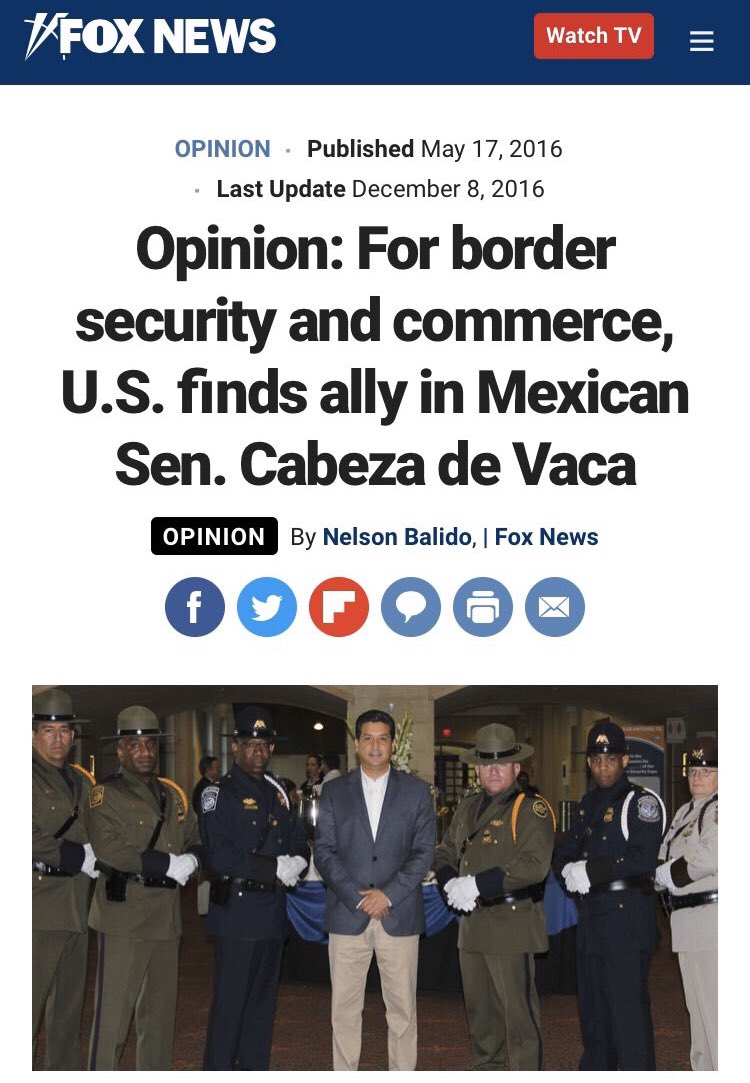
One line in Balido's column is particularly notable:
In Cabeza de Vaca, the United States finally finds someone who wants to collaborate at the state level.
Coincidentally, Breitbart News’ Mexico team also shared that sentiment. In a 2017 interview with Brandon Darby and Ildefonso Ortiz, co-creators along with Steve Bannon of Breitbart's “Cartel Chronicles”, Darby explained why working with Mexico at the state level would be preferable. According to Darby:
Under the Merida Initiative, it seems to be counterproductive to operate hand in hand with Mexican federal forces, as the Mexican president himself could (and seems) to have links with the cartels. Perhaps it would be much better to selectively interact with state governments.

In April of 2016, then-Senator Cabeza de Vaca and Nelson Balido met with officials from DHS, FBI, DoD, the Mexican Navy (SEMAR) and Army (SEDENA) to discuss a state-level binational plan for border security.
With days to go before the June 2016 election, Cabeza de Vaca and Nelson Balido gave an interview in which the candidate explained the benefits of facilitating collaboration between Texas and Tamaulipas for the prosperity of both states. According to Cabeza de Vaca:
If you put Texas and Tamaulipas together, the potential is enormous. So many other states wish they had 17 border crossing points. That is what we have. Gas, petroleum, we have so much. [...] We need to sell this area as one region. All the benefits we have together, we can lower the cost of manufacturing, we have our version of Eagle Ford Shale [a vast deposit of hydrocarbons in Texas]. The potential is enormous. We have a lot of wealth we have not utilized. We have agriculture, cattle, the best wind, we have petroleum and natural gas.
The collaboration, according to Cabeza de Vaca, would also provide benefits for the security of both Tamaulipas and Texas. If elected, Cabeza de Vaca assured that his administration would create "the best police the State of Tamaulipas ever had," by training and certifying "ten to 20 percent" or approximately 1,000 Tamaulipas police in the state of Texas using federal funding from the U.S. State Department's Merida Initiative.
On June 5, 2016, Cabeza de Vaca was elected governor of Tamaulipas. Ten days after the election, U.S. CBP Rio Grande Valley Sector announced the launch of the Se Busca Información (Seeking Information) initiative targeting the 10 most wanted criminals in the region.
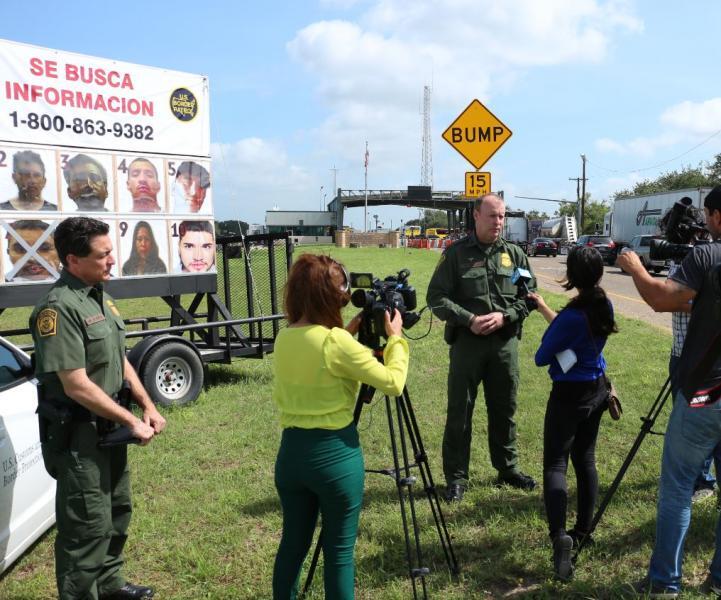
Although a partnership with the state government of Tamaulipas was not ceremoniously announced until June of 2018, behind the scenes, the Mexican Navy and U.S. federal, state and local law enforcement were training a specially-vetted police unit from the ground up
Law enforcement training on the U.S. side was prioritized in Texas's Rio Grande Valley with the passage of Texas House Bill 1887, which was signed into law by Governor Greg Abbott in 2015. The legislation authorized the development of a police training academy called the Regional Center for Public Safety Excellence (RCPSE) on the South Texas College campus in Pharr, Texas, the district of U.S. Congressman and House Homeland Security Appropriations Committee member Henry Cuellar.
Built on the South Texas College campus in Pharr, Texas, the RCPSE offered associate degrees in subjects useful for training a workforce to fill positions in the lucrative industries administering the increasingly militarized U.S.-Mexico border.
The president of the South Texas College explained to Texas legislators debating the bill that the RCPSE would offer opportunities for local, state and federal funding, particularly from DHS.
While the militarized border-industrial complex was expanding with funding from self-dealing politicians, the U.S. began an unprecedented state-level partnership with the security forces in Tamaulipas.
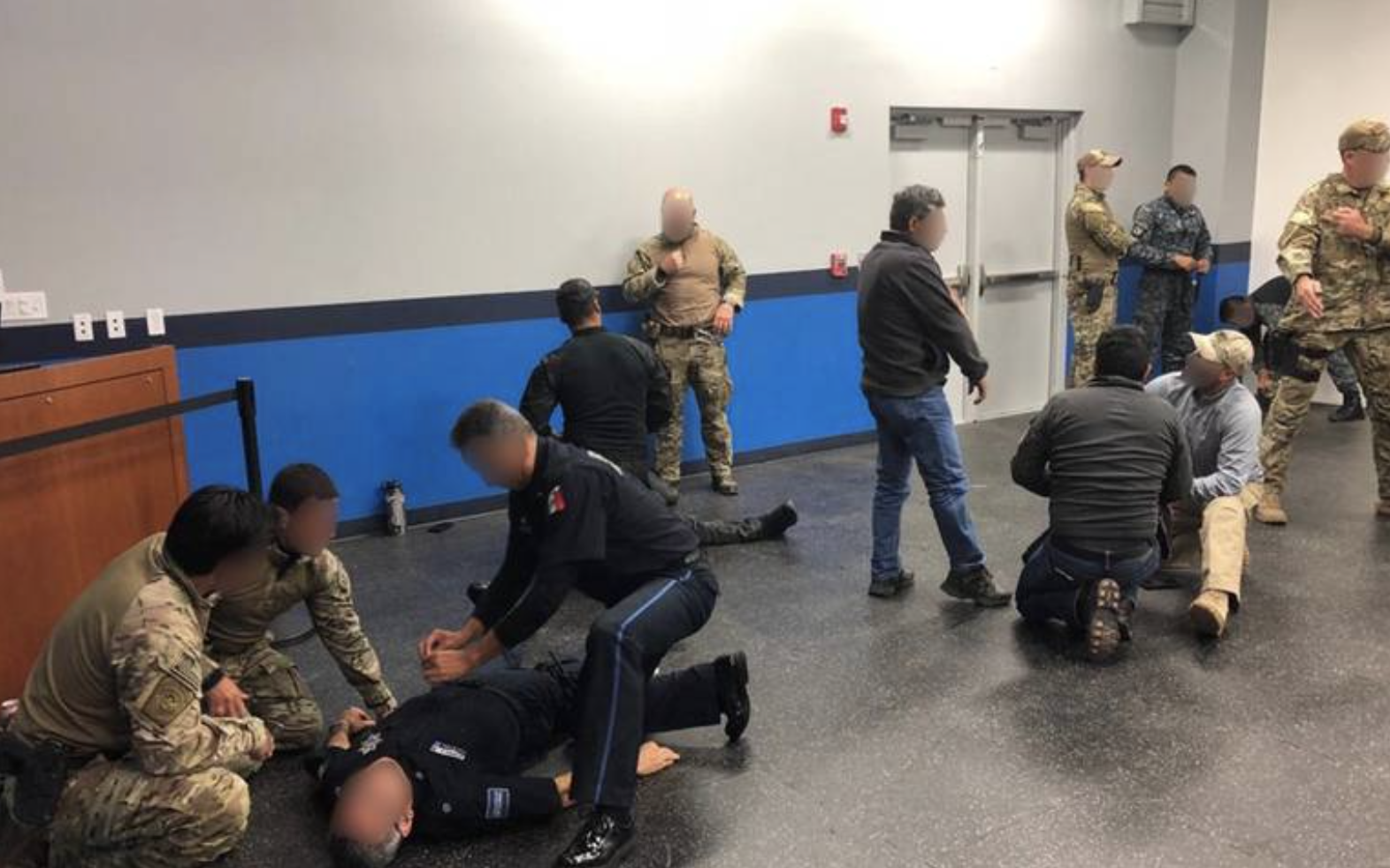
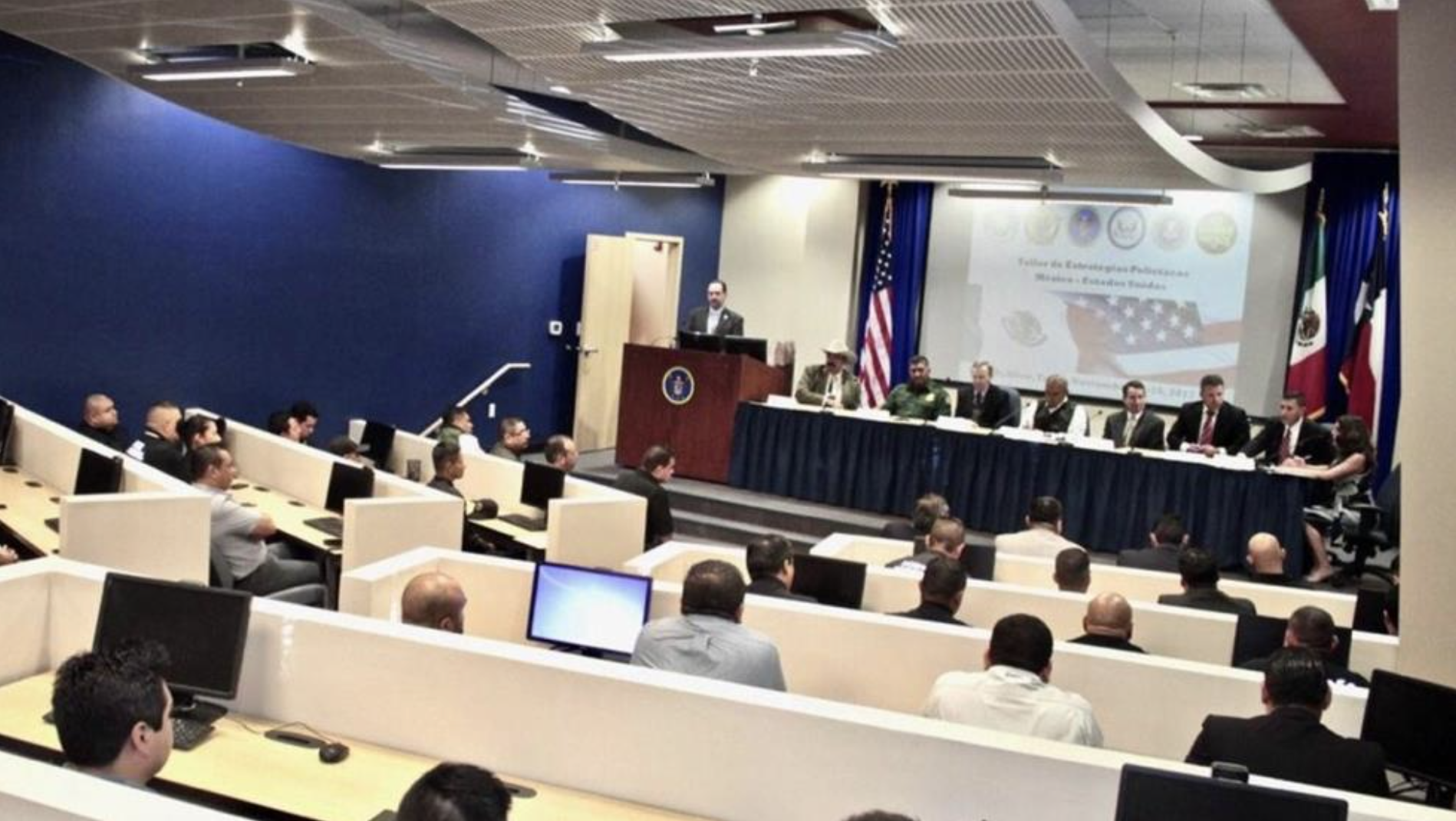
In an October 2017 interview, the Tamaulipas Secretary of Economic Development, Carlos Talancón, described some of the training and assistance the U.S. was providing:
CBP has been training our new state police force in Texas. The U.S. consuls of Nuevo Laredo and Matamoros have visited us in Ciudad Victoria. They have given us equipment, trained dogs. We have been working together with them. They are now training our trainees in Texas. We have been working for the last nine months with them.
In the context of the same interview about U.S. training and assistance, Talancón also described an extermination campaign against the remaining "cockroaches." According to Talancón:
We are terminating the different leaders. All their soldiers do not have money for gas. They have arms and they are stealing the cars to keep moving. We have a lot of military coming in. About 30 trucks have arrived in Rio Bravo. We are terminating the last cucarachos (cockroaches). They do not have funds, they do not have money, they are just looking around to see where they can get money because they are on their last legs. We are terminating them.
From approximately January 2017 until at least January 2019, the Tamaulipas state police trained with U.S. federal agencies, including the Diplomatic Security Service (DSS), FBI, Immigration and Customs Enforcement (ICE), CBP, Border Patrol (BP) and other federal law enforcement, as well as state and local law enforcement agencies in Rep. Cuellar’s district in Texas.
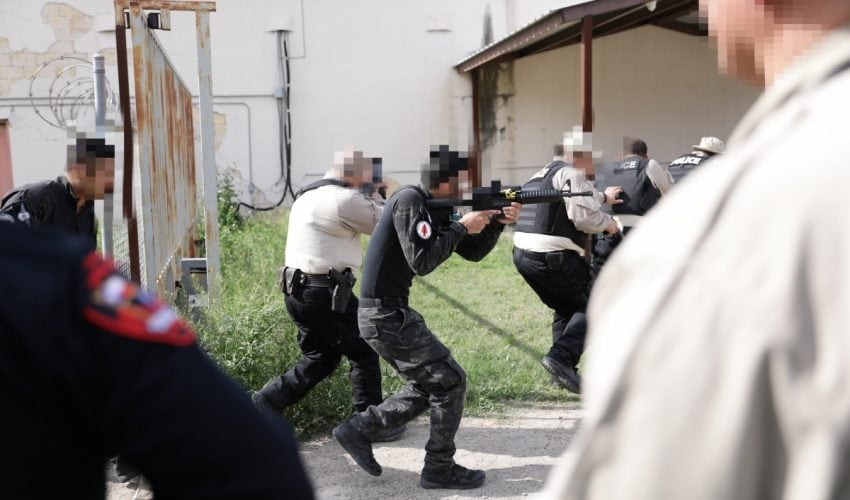
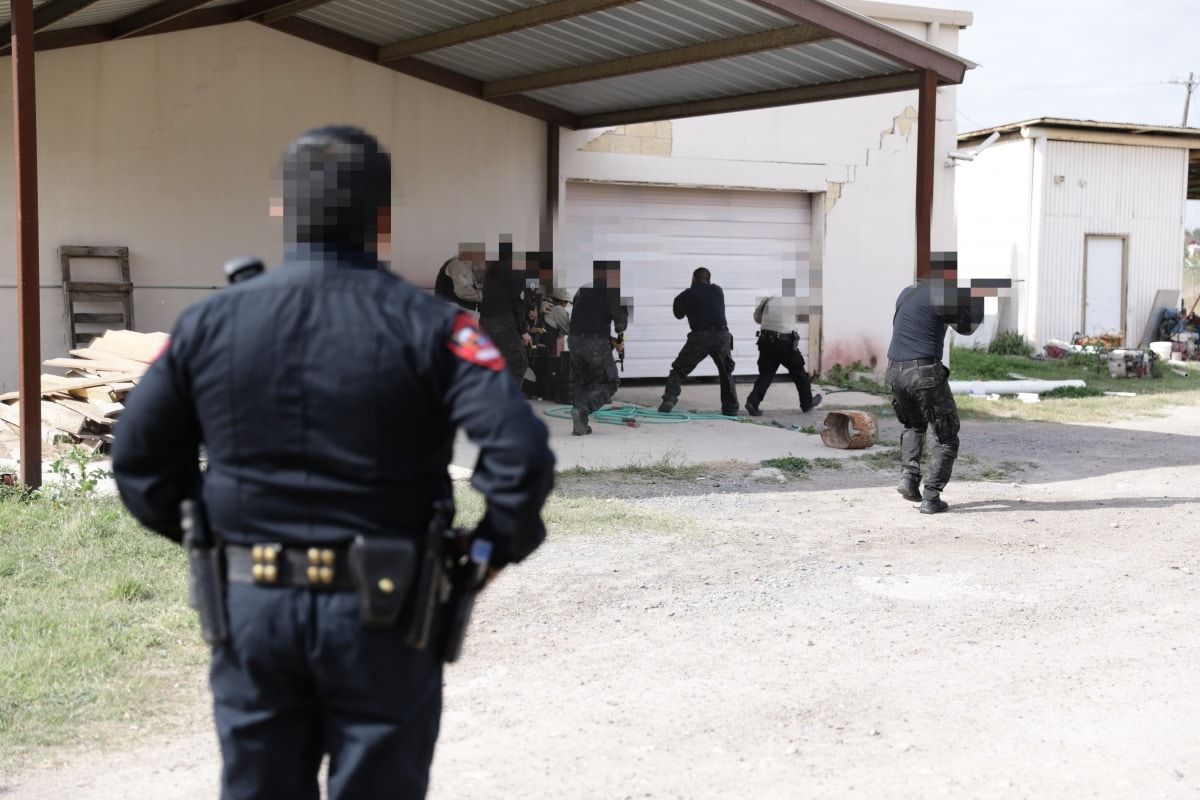
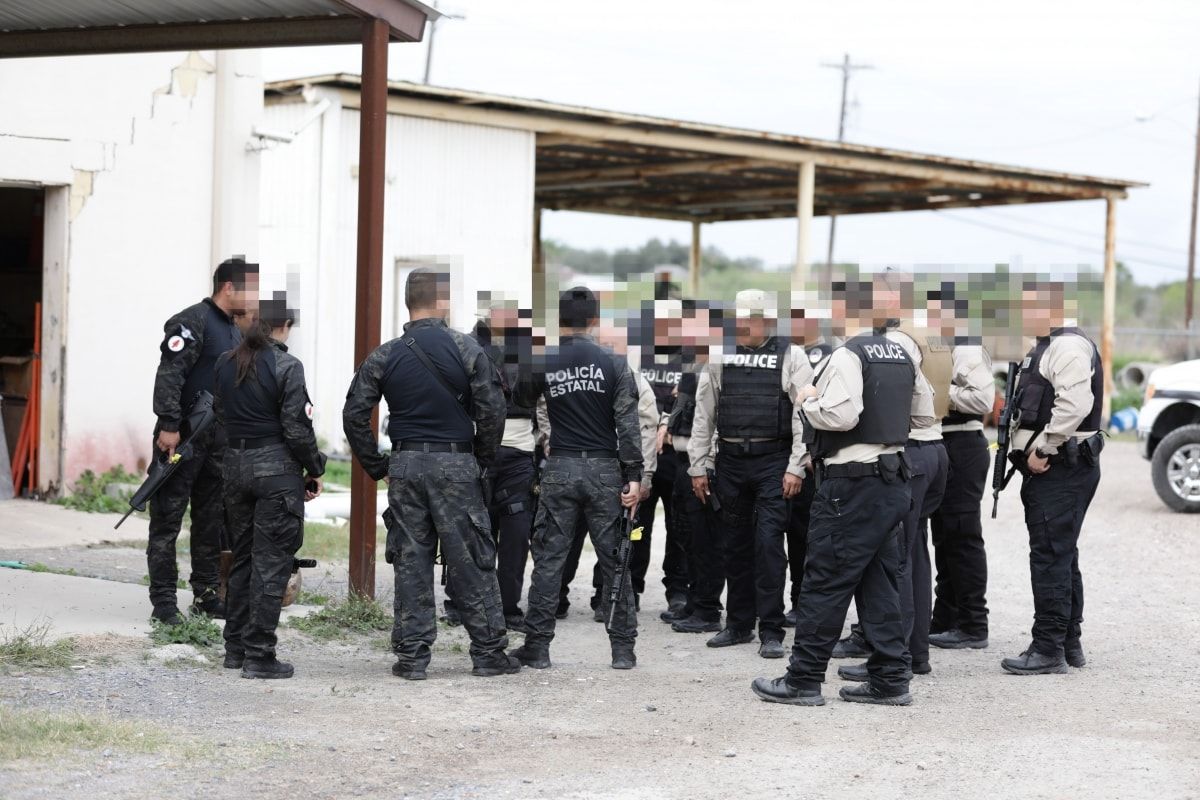
On June 7, 2018, a week after the Mexican Navy special forces were withdrawn from Tamaulipas for what was later determined to be at least 47 forcible disappearances and extrajudicial executions in Nuevo Laredo (including one U.S. citizen), JTF-West formally announced a cooperative partnership with the state government of Tamaulipas called the Campaign for Security and Prosperity. The campaign was intended to promote intelligence sharing and cooperation between Tamaulipas authorities, the U.S. federal and Texas state and local law enforcement agencies.

The ceremony was attended by officials from U.S. CBP, Governor Cabeza de Vaca and Nelson Balido. A poster for the Se Busca Información initiative hung in the background.
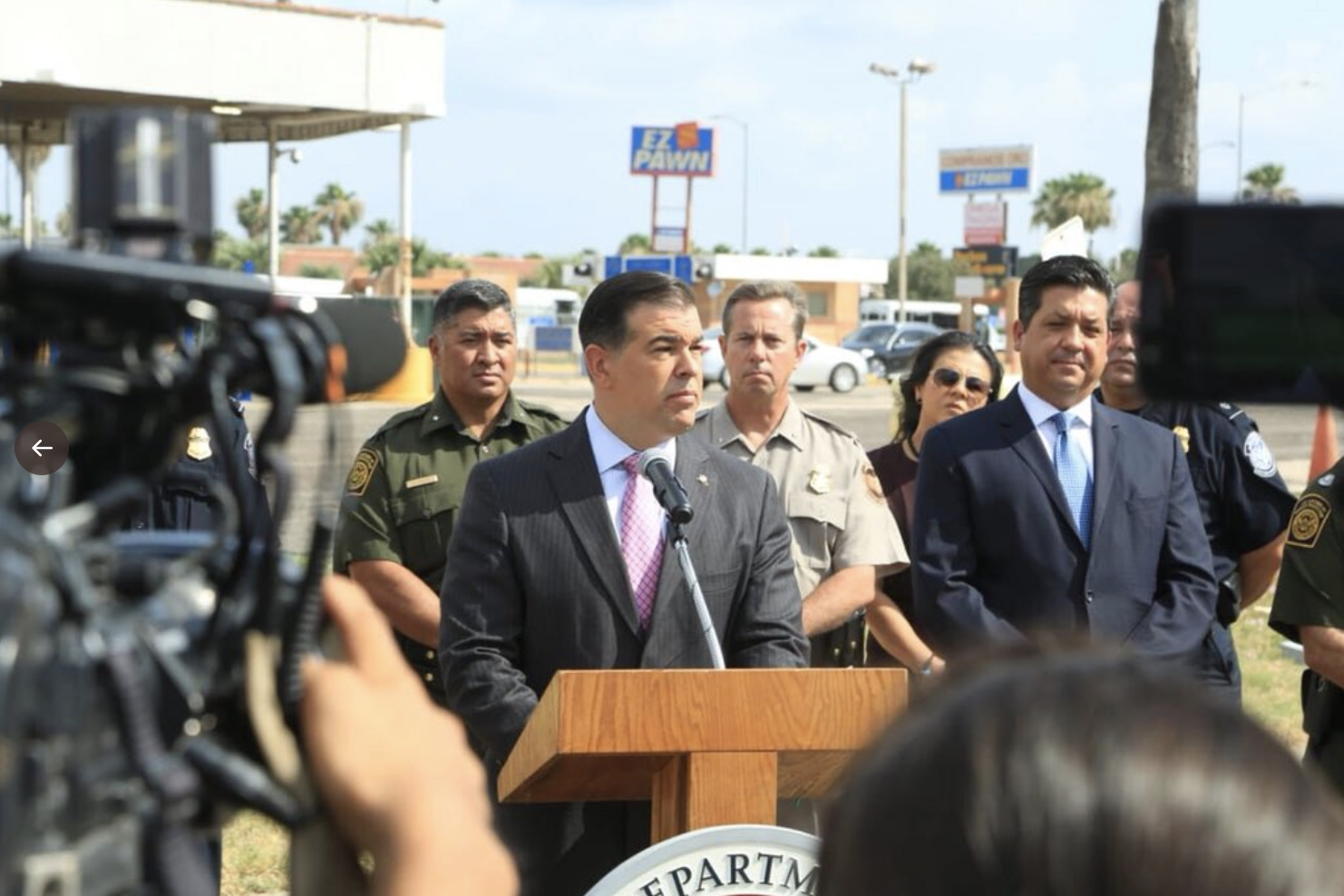
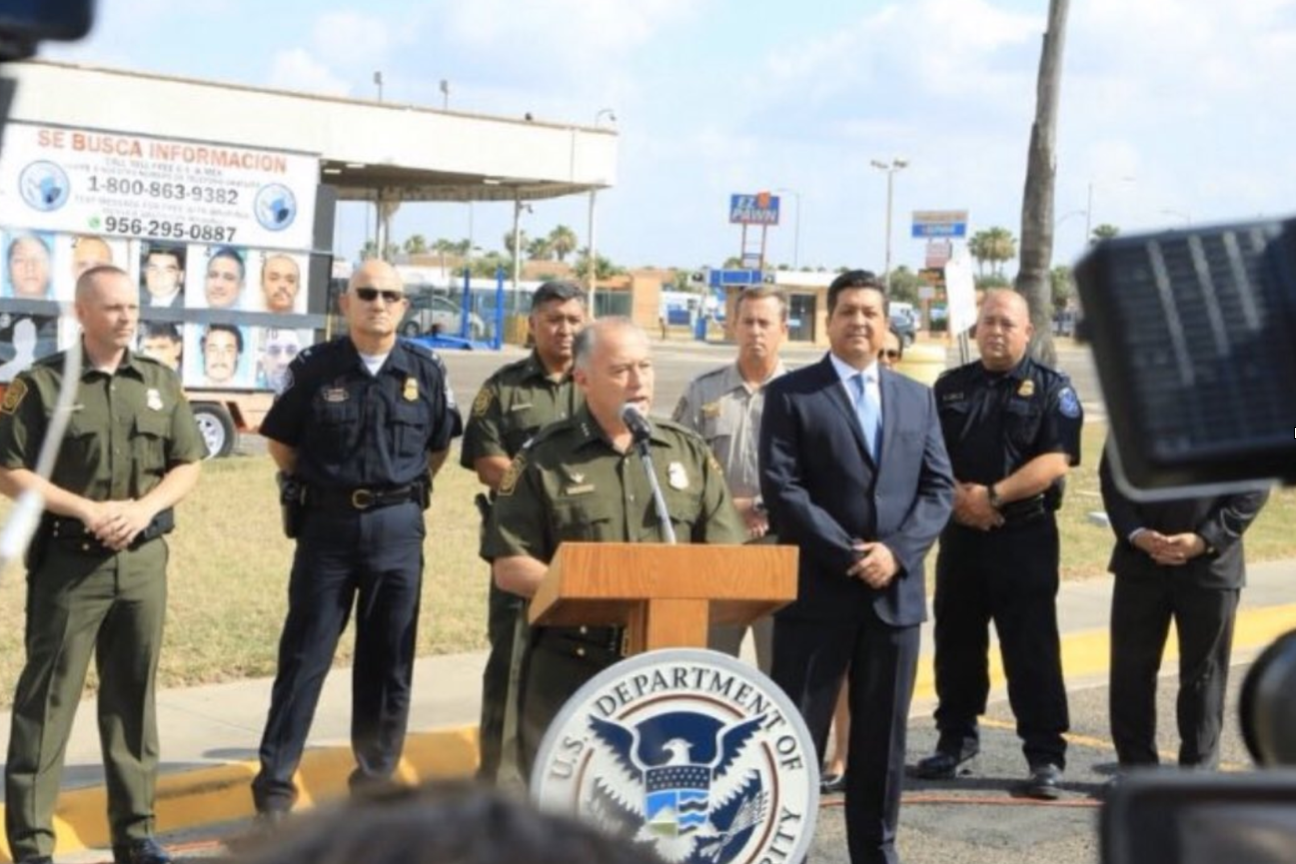
But not everything has been secure and prosperous in Tamaulipas. Two of the state’s most important border cities, Reynosa and Nuevo Laredo, have been disputed between the state and various offshoots of the Gulf cartel and Los Zetas for the last decade or so.
Nuevo Laredo connects Monterrey, the financial capital of northeast Mexico, to I-35 in Laredo, Texas. The enormous volume of commerce that moves through the border city (an estimated 40-70% of all U.S.-bound commercial traffic), makes it perhaps the single most important crossing in all of Mexico. Cártel del Noreste (CDN), a faction formerly with Los Zetas, is the predominant criminal organization in Nuevo Laredo.
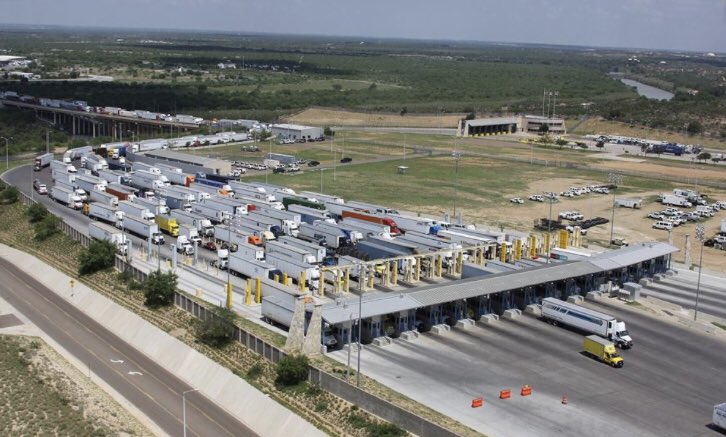
Reynosa is the largest city in Tamaulipas with many maquilas (factories where goods are assembled with cheap labor) and also connects to Monterrey. Reynosa and the surrounding area are also where a majority of human smuggling into the U.S. happens. The Metros faction of the Gulf cartel is the predominant criminal organization in the city.
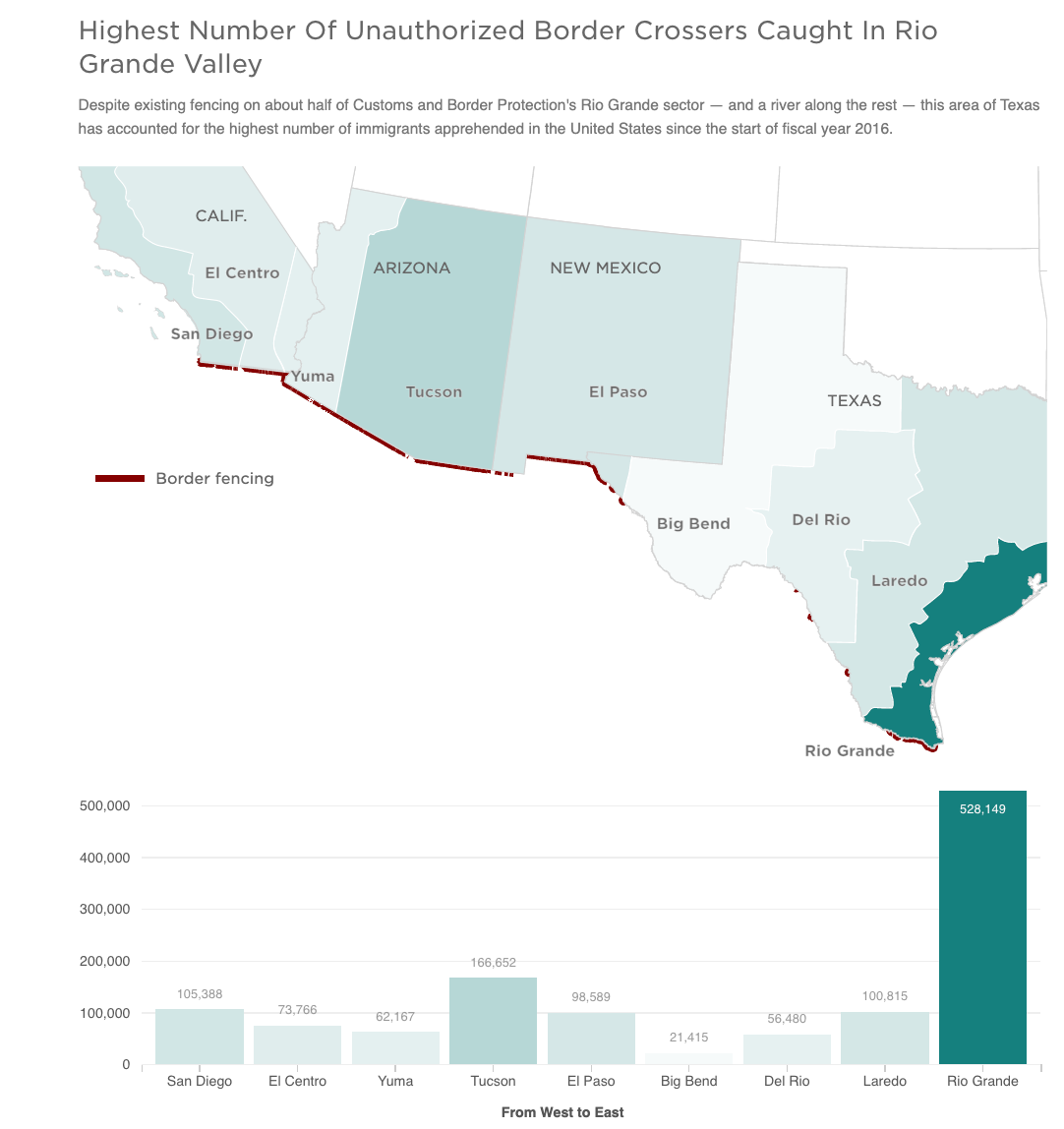
The state government as well as the Gulf cartel in Matamoros—the criminal rivals of CDN and the Metros faction of the Gulf cartel—are interested in the valuable, hydrocarbon-rich territories in and around Nuevo Laredo and Reynosa.
Although the Matamoros factions of the Gulf cartel are among the oldest and most established criminal networks in Mexico, the Tamaulipas government devotes the majority of its efforts to criminal groups in Nuevo Laredo and Reynosa.
How exactly criminal organizations and individuals are prioritized is unclear, but according to Cabeza de Vaca, the most violent groups and individuals in the state are the highest priorities.
However, the complex relationship between organized crime and politics may actually be the reason CDN and the Metros faction of the Gulf cartel are prioritized.
Messages purportedly from the Gulf cartel have claimed that Cabeza de Vaca and his brother, the PAN Senator Ismael Cabeza de Vaca, were given 0 million for their campaigns by the cartel.
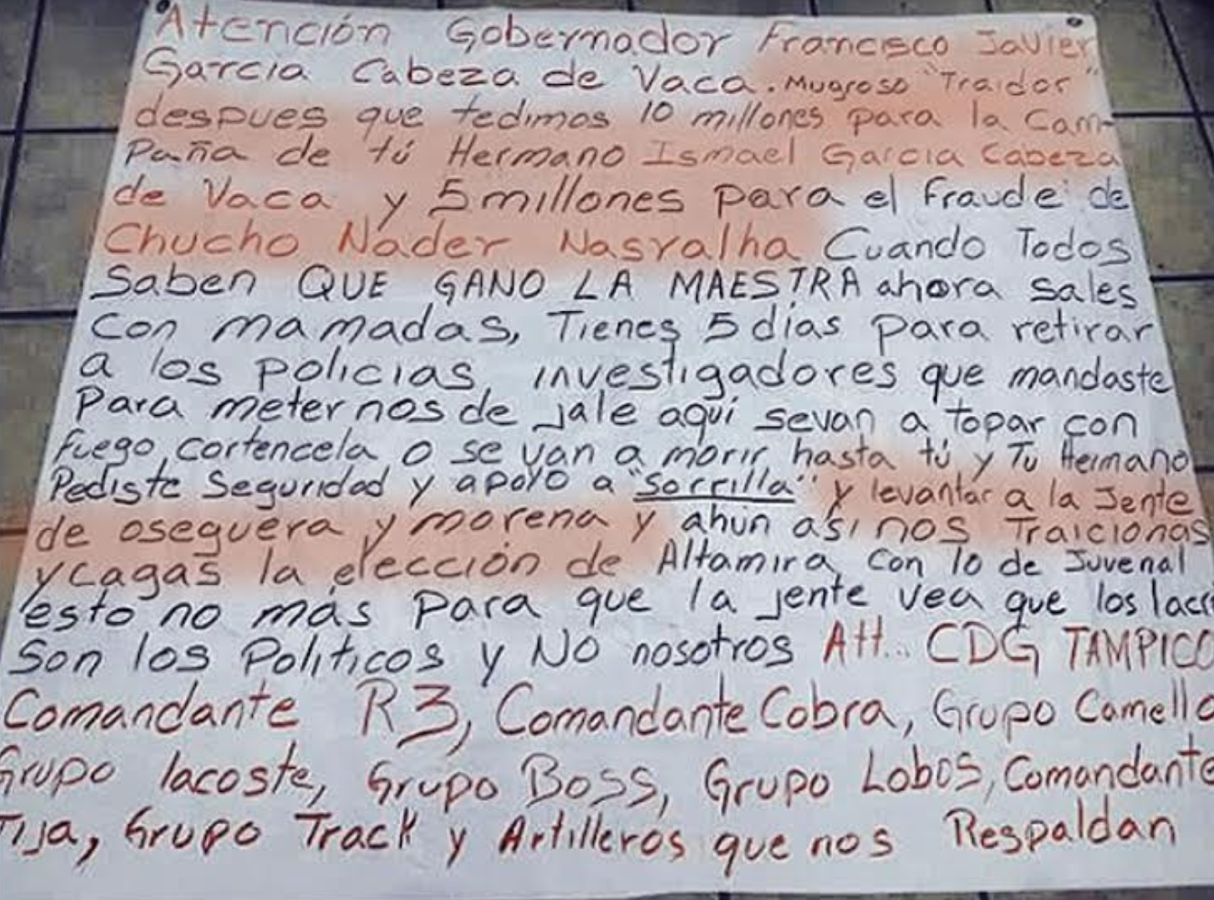
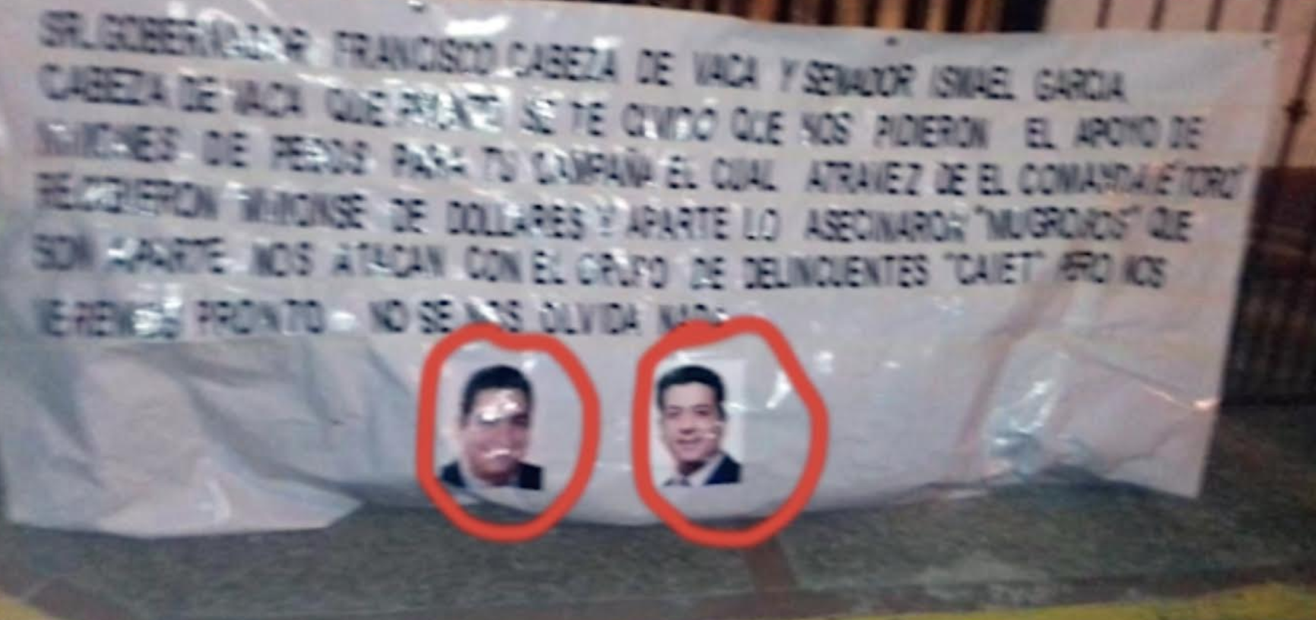
Whether the claims in the messages are true or not, and whether the messages are actually from the Gulf cartel or not, is unknowable. However, it should be reiterated that Cabeza de Vaca was alleged to have gotten his start in Tamaulipas politics with half a million dollars from the Gulf cartel in Matamoros.
The Cabeza de Vaca administration’s approach to security appears to be one of pacification of groups that pay to conduct their business without being disturbed and prosecution of the rivals of the favored groups.

But the support for this approach is not just from the Tamaulipas government. Breitbart News and even a United States Congressman, Chip Roy of Texas, Ted Cruz's former Chief of Staff and the former staff director for Senator John Cornyn's leadership office, also favor prioritizing certain groups.
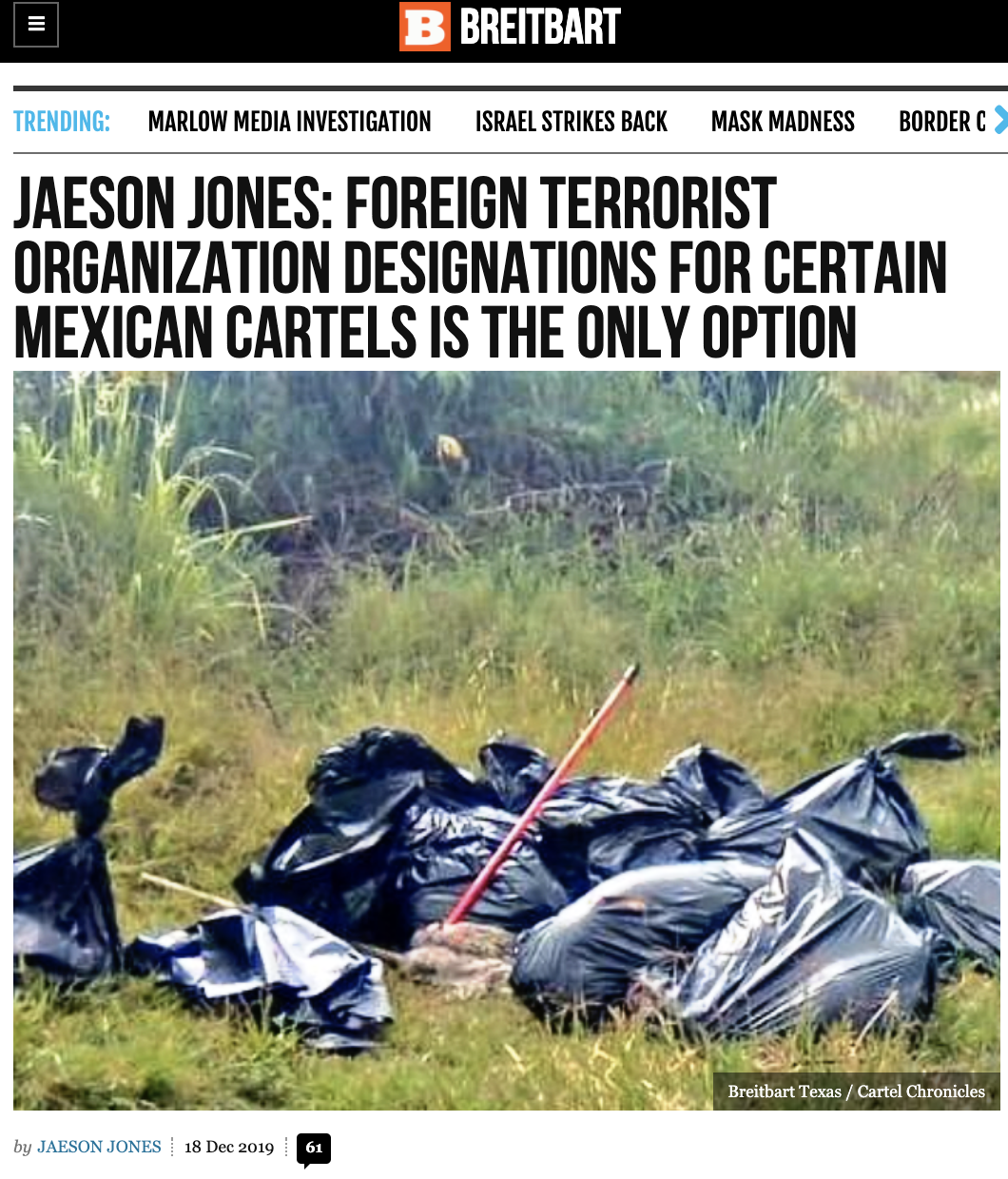
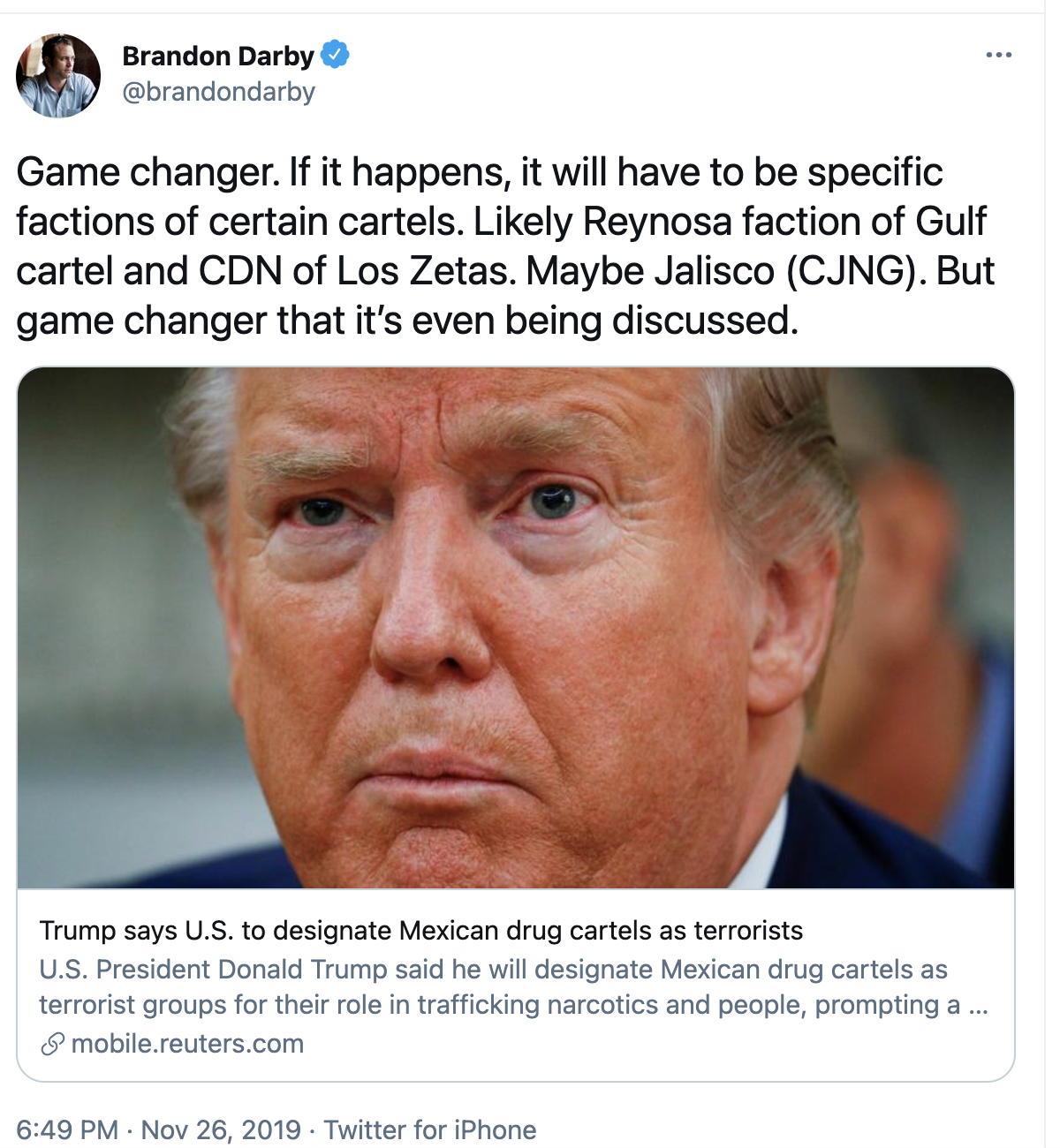
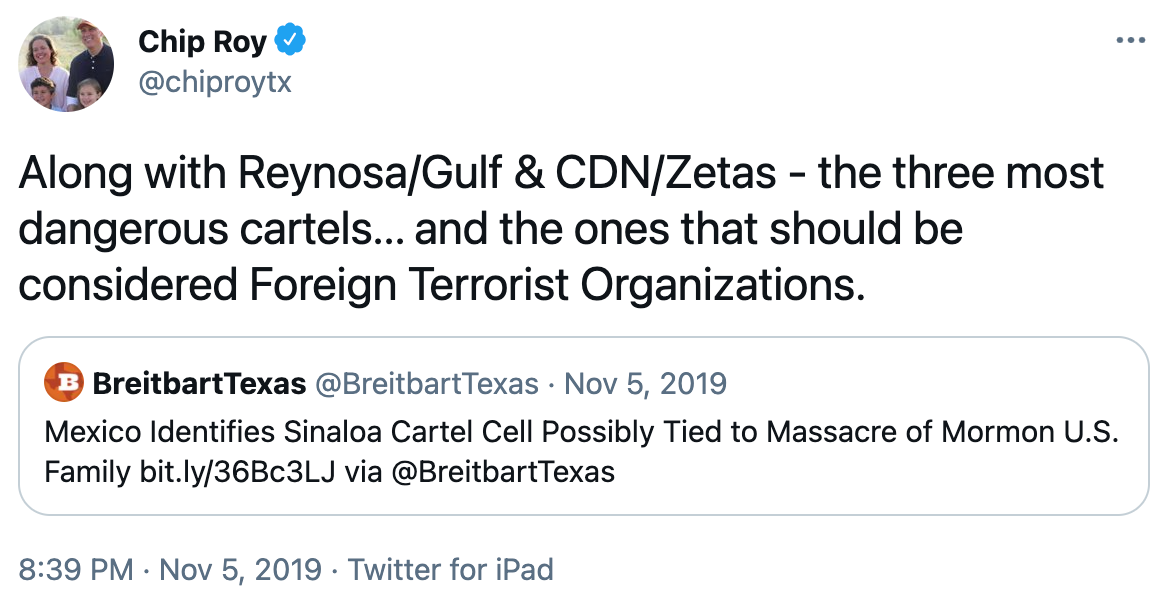
In fact, Congressman Roy and 15 Republican co-sponsors favored this approach so much that they wrote the Drug Cartel Terrorist Designation Act (House Resolution 1700) that called for codifying the prioritization strategy. The original bill would have designated CDN, Los Metros and CJNG (a group without a significant presence in Tamaulipas, but who were rumored to have an alliance with Los Metros in 2019 when the bill was written) as foreign terrorist organizations.
Congressman Roy later announced a revised version of the bill in April of 2021 which specified only CDN and the Metros faction of the Gulf cartel. The two largest and most powerful criminal networks in Mexico, the Sinaloa federation and CJNG, are not included in the bill.
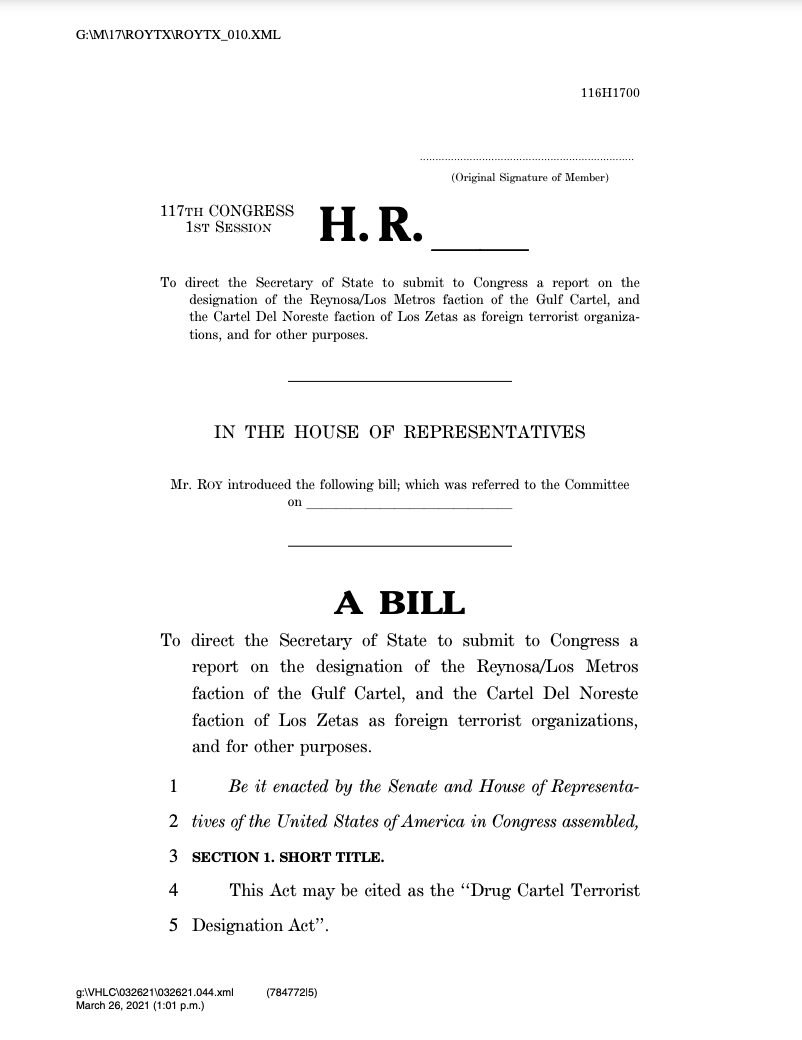
In February of 2020, Congressman Chip Roy wrote the Border Visibility and Security Act, which would compel the U.S. to purchase a variety of surveillance tech such as ground radar and other sensors for detecting human movement, clear vegetation along the Rio Grande and build roads along the U.S. side of the border.
As luck would have it, a majority of the supporters that Nelson Balido's 501(c)(3) Border Commerce and Security Council represents are surveillance tech, infrastructure and contracting companies.

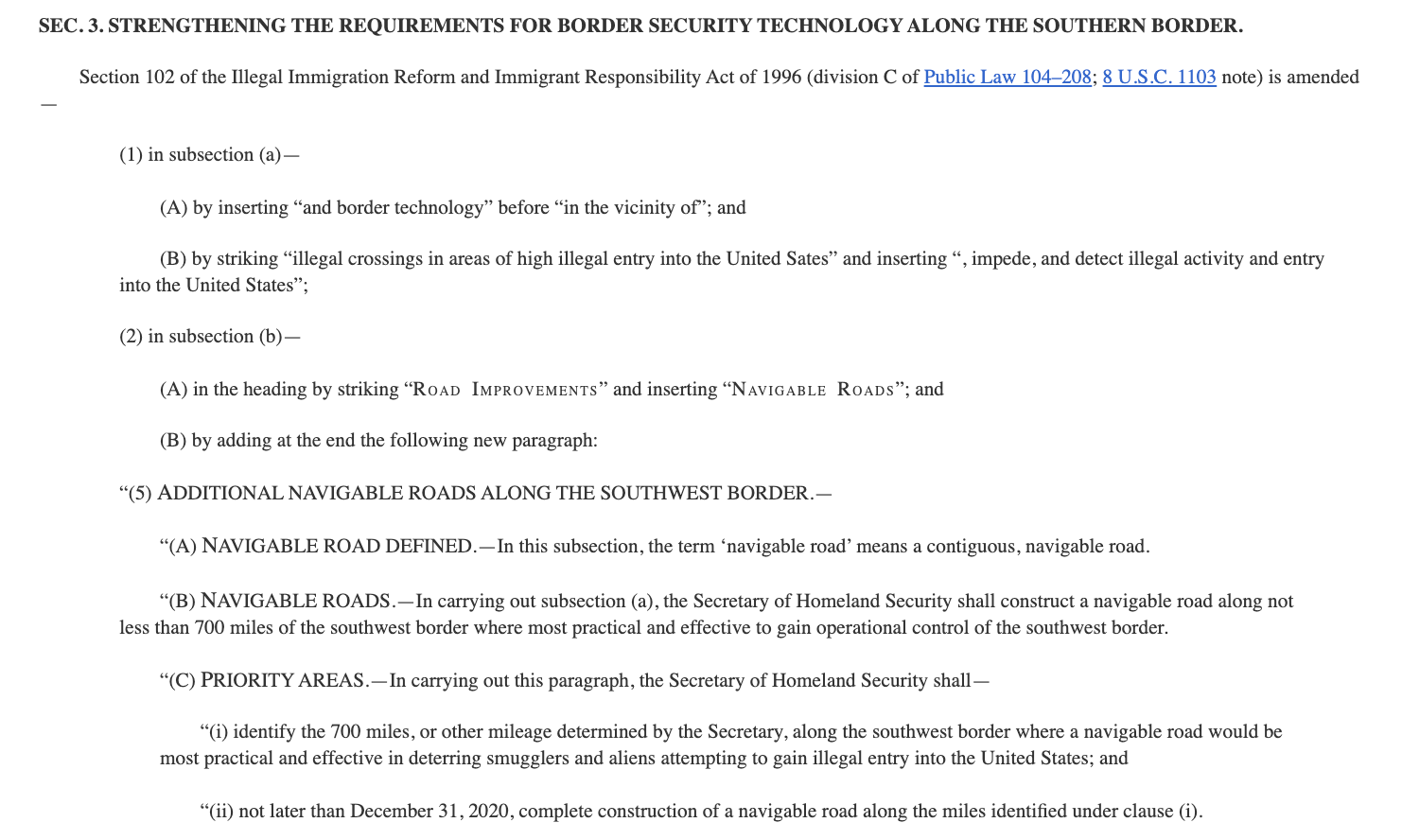
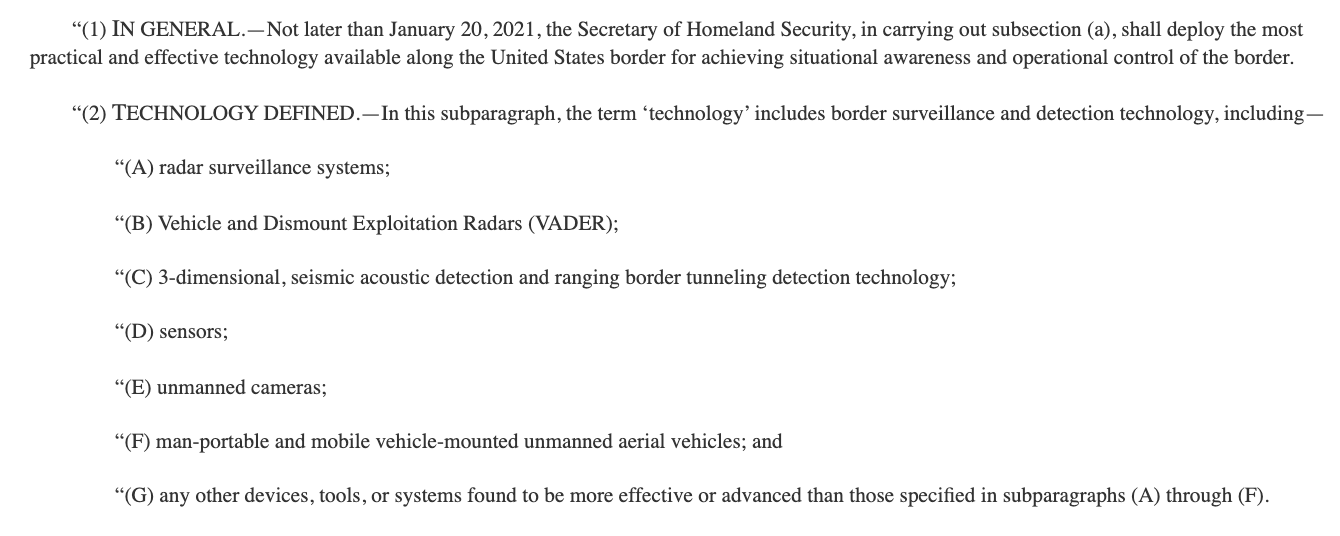
In effect, the Border Visibility and Security Act would hand billions of dollars in business to companies whose interests are represented by Nelson Balido, a lobbyist with ties to DoD, DHS, Ted Cruz and Chip Roy—Cruz's former Chief of Staff and the bill's author—and a governor in Tamaulipas allegedly beholden to the Gulf cartel.
Narcoterror & "a major messaging operation"
Coined in 1983, the term 'narcoterrorism' was originally applied to violent drug trafficking organizations in Colombia and Peru. In Mexico, the concept of narcoterrorism has gained popularity in academic literature since at least 2008, primarily in reference to Los Zetas.
A 2009 paper apparently written as a part of graduate coursework at the online American Military University proposed creating an interagency task force for sharing intelligence in an effort to combat the threat posed to U.S. law enforcement (particularly Border Patrol) by "the Los Zetas narco-terrorist organization."
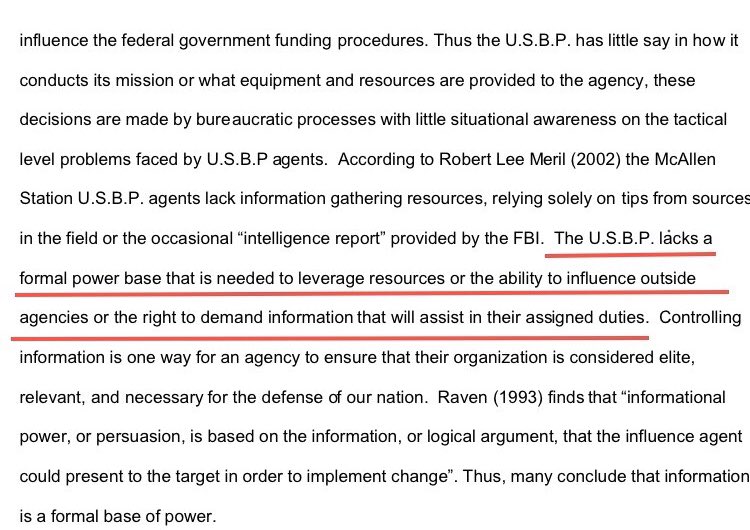
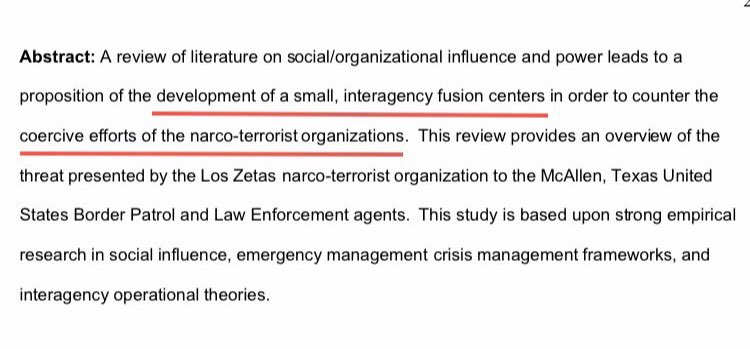
In Mexico, several popular anonymous social media personas that post crime scene photos and execution videos also refer to certain criminal groups as "narco-terrorists."
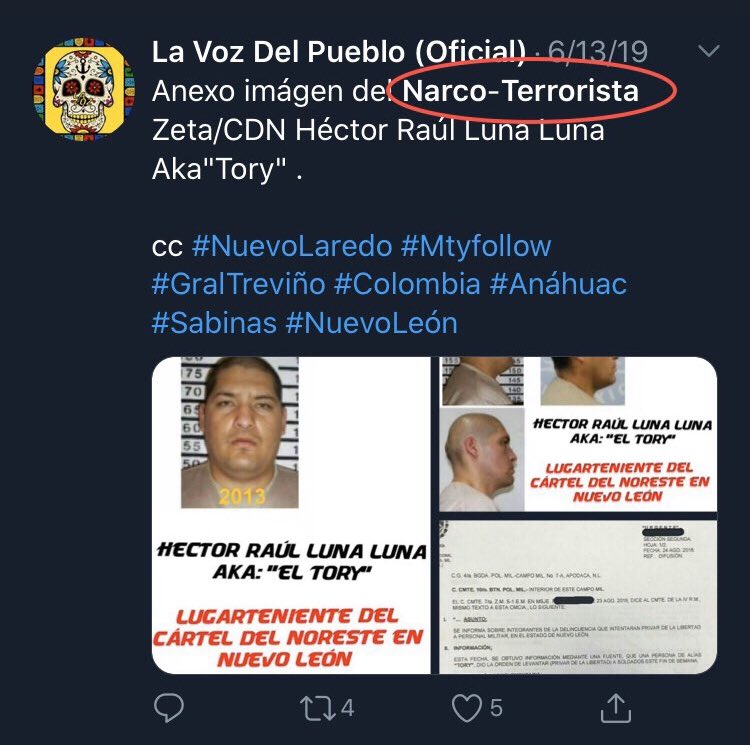
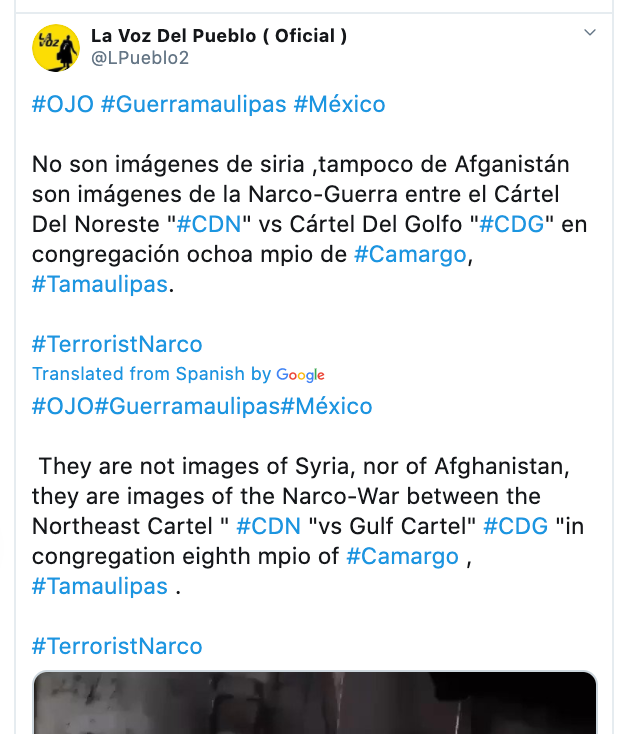
These anonymous personas first appeared around the same time as Twitter in the late 2000s and early 2010s when the record levels of violence in Mexico began. They purport to be “citizen journalists” bringing an uncensored look at the violence in Mexico by posting content often leaked illegally by the police via private WhatsApp chats. Some of the most prominent ones are rumored to be professional journalists contracted by the Tamaulipas social communications office, who is said to be paying them by buying ads in their publications.
Others may be getting paid directly for content. In a 2017 interview with Breitbart's Brandon Darby and Ildefonso Ortiz, Ortiz recalled that Steve Bannon suggested that they just hire "citizen journalists" during their initial brainstorming session for Cartel Chronicles in 2014. According to Ortiz:
Our initial objective was to focus on tweeters, local journalists and citizen journalists at risk, who cannot say what is happening in the areas controlled by the cartels. Bannon then said to me, 'Hire them,' and we thought between the three of us about how these people could contribute and communicate real, unfiltered information.

Brandon Darby has also admitted to paying anonymous "citizen journalist" sources during a panel with Jack Posobiec and Ann Coulter at Turning Point USA's Student Action Summit in December of 2019. According to Darby:
"When we looked at the border problems, we realized that some people covered the border on the north side and the U.S. side, but not so much, and no one was really covering the border on the south side, right? So the entire border wasn't being covered and we tried to figure out why, and what we realized was that no one was covering it on the south side because everyone who did got murdered, and so no one would cover it. And we said, 'wait a minute, we're, like, Breitbart, right? We can't just—y'know, we're supposed to be a voice for the voiceless. We're supposed to stand up for the little guy, for the 'citizen journalist.' So what we did was we went there and we started finding people in the communities who wanted to speak out, or who were speaking out under pseudonyms or under anonymous social media accounts, and we said, 'hey, wait a minute; you're risking your life to fight these cartels on the border and 500 people see what you say on Twitter, right? On your anonymous account; why don't you send that stuff to me and I'll pay you and then we're going to publish it in English and Spanish and we'll throw the whole weight of what Breitbart has politically behind it to make sure that Americans know what's happening here."
Curiously, Darby went on to claim that Breitbart had been paying "citizen journalists" for approximately 2 to 3 years before Cartel Chronicles existed.
"And so what we've seen is that since we've been doing that roughly 7 or 8 years ago [from 2019], people care now, and the more people that care, the more people who listen to this message and the more people who see what's happening, they care, then the Republicans start using it as talking points, and eventually, we hope it translates into actual policy, which we're maybe starting to see, like, we have a president talking about cartels, which is the biggest thing in the world."
According to Darby, Breitbart's Cartel Chronicles are essentially a messaging and influence operation targeting Republicans, including elected officials, in order to create momentum for certain policies.
In a 2019 interview for the PBS series Frontline, Steve Bannon elaborated his views on border security and persuading President Trump, known for propounding and later walking back some of his administration's hard-line mandates. According to Bannon, tough policies like criminally prosecuting anyone caught entering the country illegally required persuading the American public as well as the President who responded the most to what he saw in the media. According to Bannon:
"What I’m concerned about is this takes a major messaging operation. You have to explain—the American people are kind of detached from the details of what’s happening on the southern border. They’re particularly detached, I think, about the reality of what’s happening in Central America. They’re detached about, you know, this cauldron, right, that’s on the southern border, particularly how it’s been not just militarized by—particularly in northern Mexico and the cartel wars of the Mexican authorities against the cartels, but how the cartels are winning. You know, in many regards, northern Mexico and even some of the southern United States along the border, as people down there will tell you, are like Afghanistan to a degree that it’s an actual war going on and an insurgency.
And so my concern at the time is that, you know, not just people hadn’t thought three moves down, but maybe the messaging is not well enough, and the battlefield’s not prepared enough to—it just kind of dropped. And understanding President Trump, President Trump is always going to respond to what he sees in the media and what—he’s a marketing guy. He’s going to— he’s going to respond. And if this thing’s not—not messaged properly, and people don’t understand what you’re trying to accomplish, then I think you can have some—some blowback."
In late 2019, the proposal to designate cartels as foreign terrorist organizations seemed to have finally persuaded President Trump. In the aftermath of the massacre of the Mormon family in Agua Prieta, Sonora in November 2019, President Trump stated in an interview that he intended to designate unspecified Mexican drug cartels as terrorists.
Brandon Darby, Ildefonso Ortiz and Chip Roy were elated by the news.
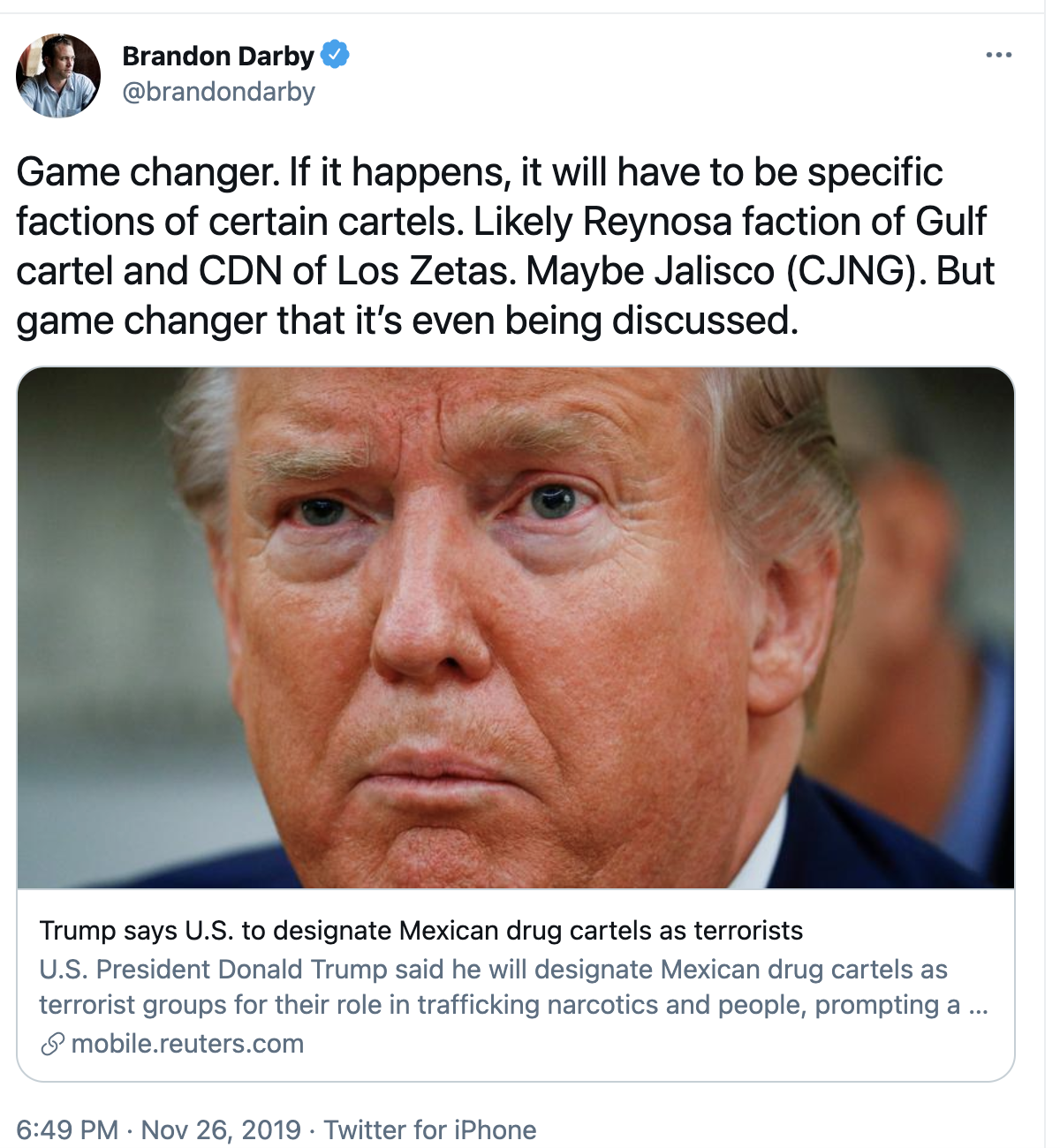
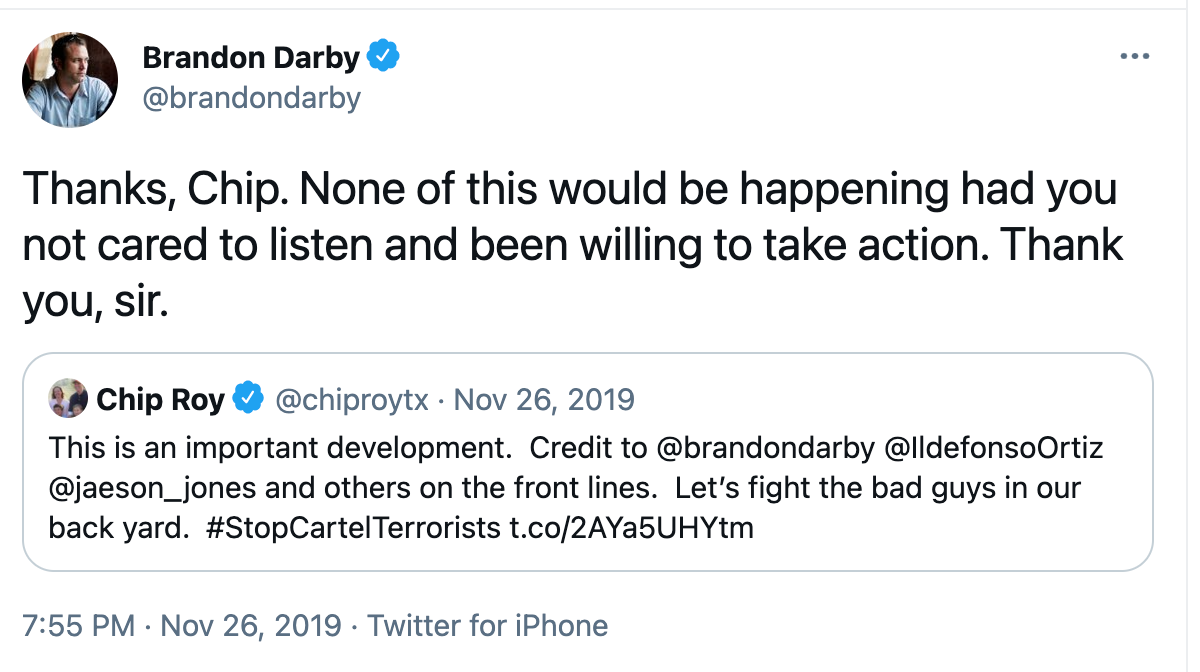
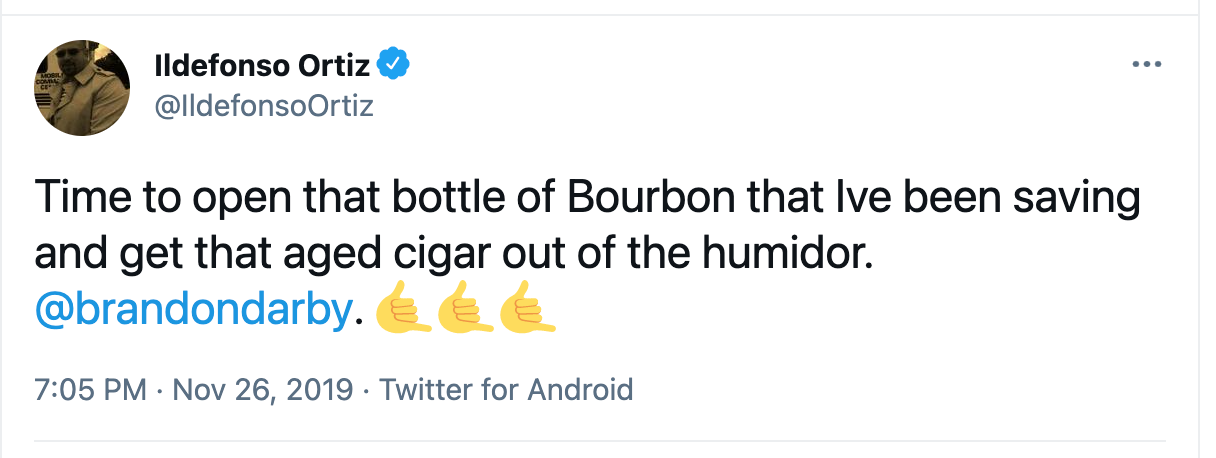
The proposal never came to fruition in all likelihood because a terrorist designation could have substantiated claims for asylum at the border.
Regardless, the justification for a terrorist designation specifically for CDN and Los Metros, who have no significant presence outside of northeastern Mexico, is not justified based on recent violent crime data.
In fact, the northeastern Mexican states of Coahuila, Nuevo Leon and Tamaulipas, which the Drug Cartel Terrorist Designation Act is explicitly targeting, are all below the national average for homicide and violent crime and have been for the last several years. Between 2018 and 2019, homicide numbers in Tamaulipas actually decreased.
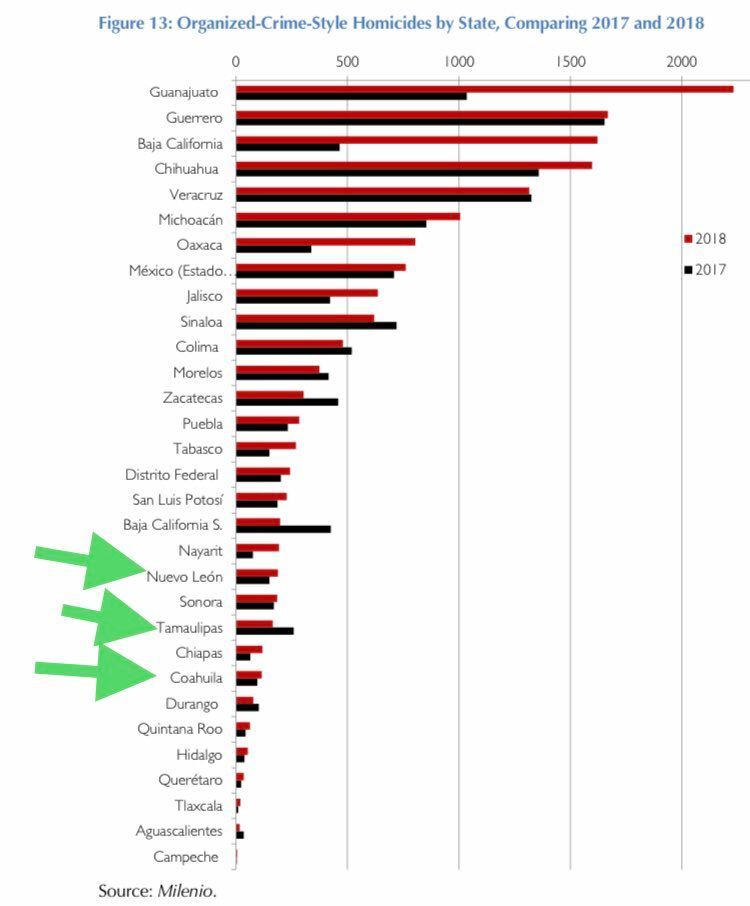
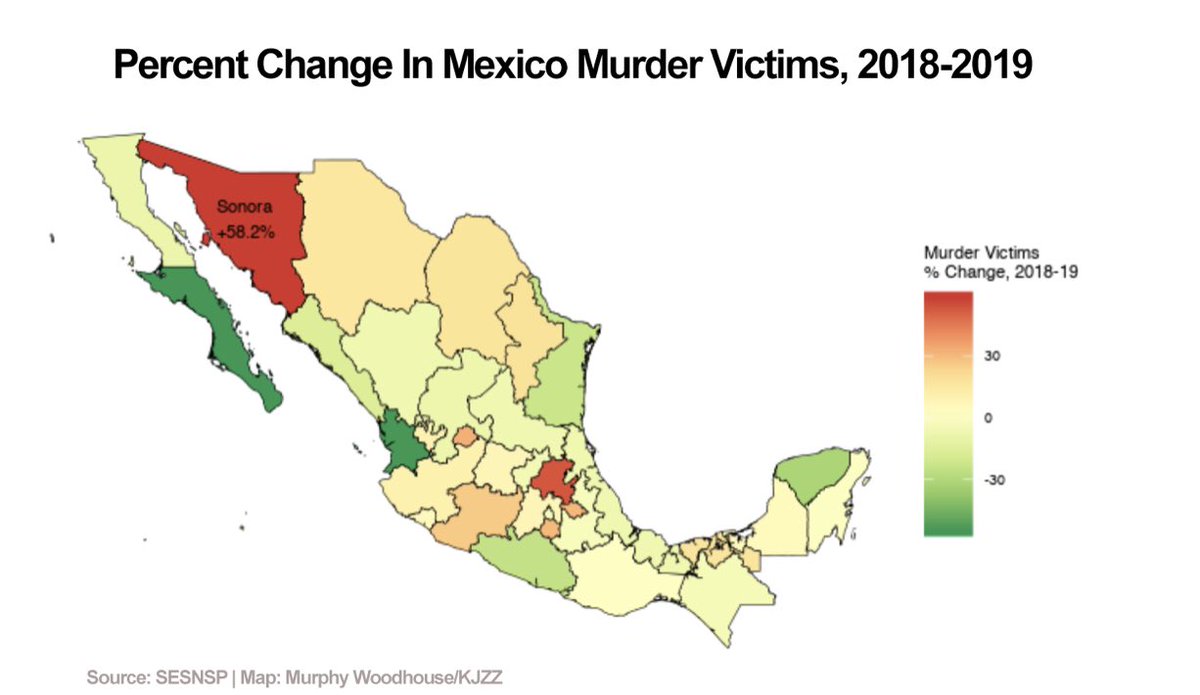
So why exactly do they want to designate these specific groups as terrorist organizations? Why all the policy papers and fusion centers and U.S.-Mexico collaborations? Brandon Darby explained it bluntly in a webcast:
"The reality of Mexico is this: they're very resource rich. There's plenty of resources in Mexico. The problem is, is that many of the regions along the border, those resources can't be exploited because of the security situation and because of the corruption situation, which is largely due to the security situation. So, though I don't suggest we engage in direct economic development in Mexico when we need it in our own country so badly in so many areas like inner cities and rural areas, I mean, you go down the line—but what we can do is address those security situations. We can more aggressively go after the rest of those people in the organized criminal circles so they fall in line with other places so that businesses are more able to invest in Mexico and invest in resource exploitation, and what have you. It's all about the security situation. Uh, the security situation... take Coahuila. Coahuila is along the U.S.-Mexico border, along the Texas border, tons of oil, but we can't exploit that oil because in order to exploit the oil, the cartels are gonna steal the gas, the cartel, I mean you go down the line."
It is—and has always been—about this.

On June 25, 2020, it was announced that the "Se Busca Informacion" initiative had expanded in Coahuila.
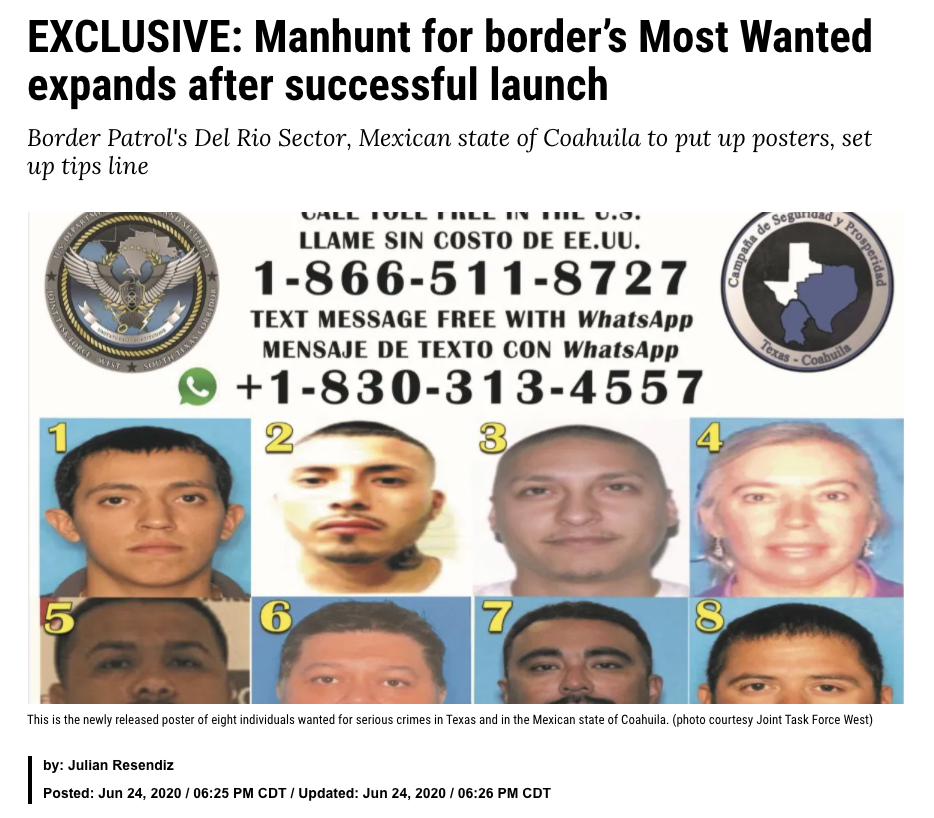
Habrá sangre
Cabeza de Vaca often points to his relationships with various U.S. politicians as proof of his integrity, like in this article about his "working tour" to Washington from September 9-12, 2019. During that trip, Cabeza de Vaca spoke at the Wilson Center and met with members of Congress and officials from the State Department, DHS and DoD.
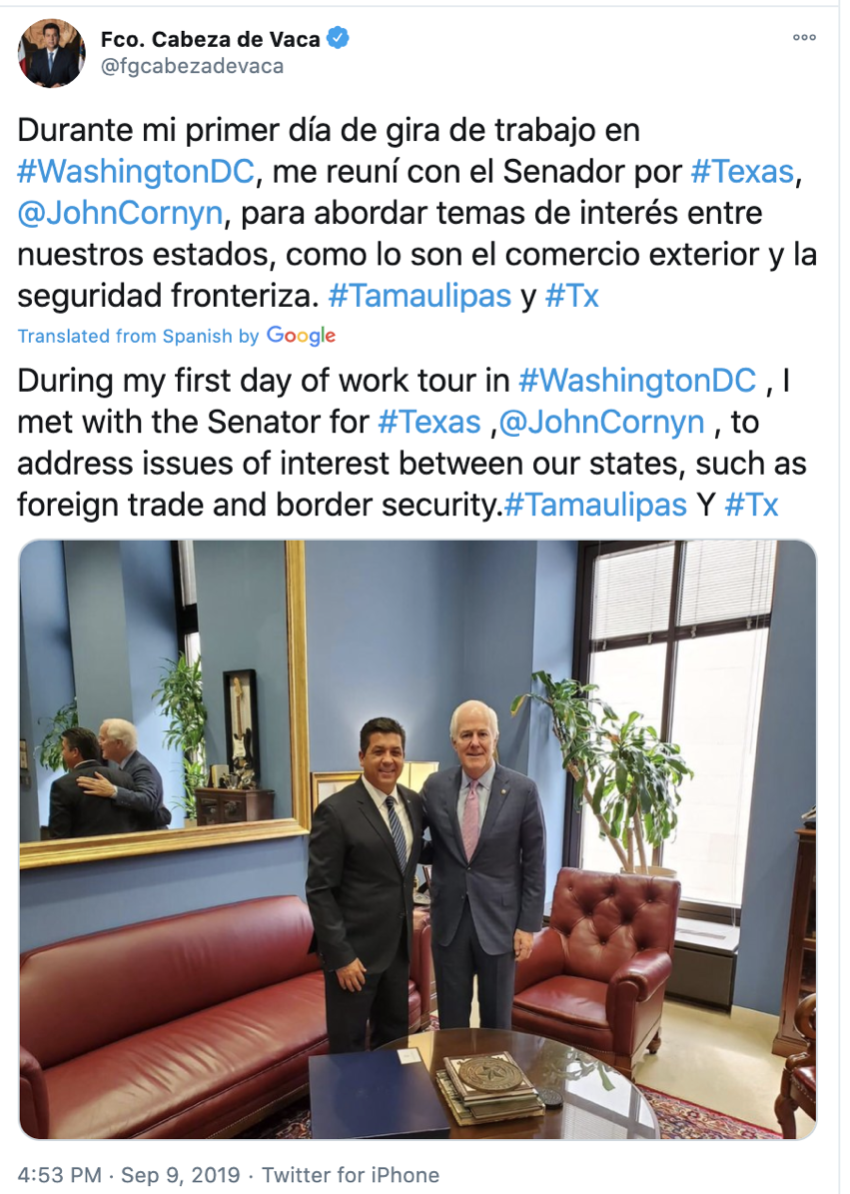
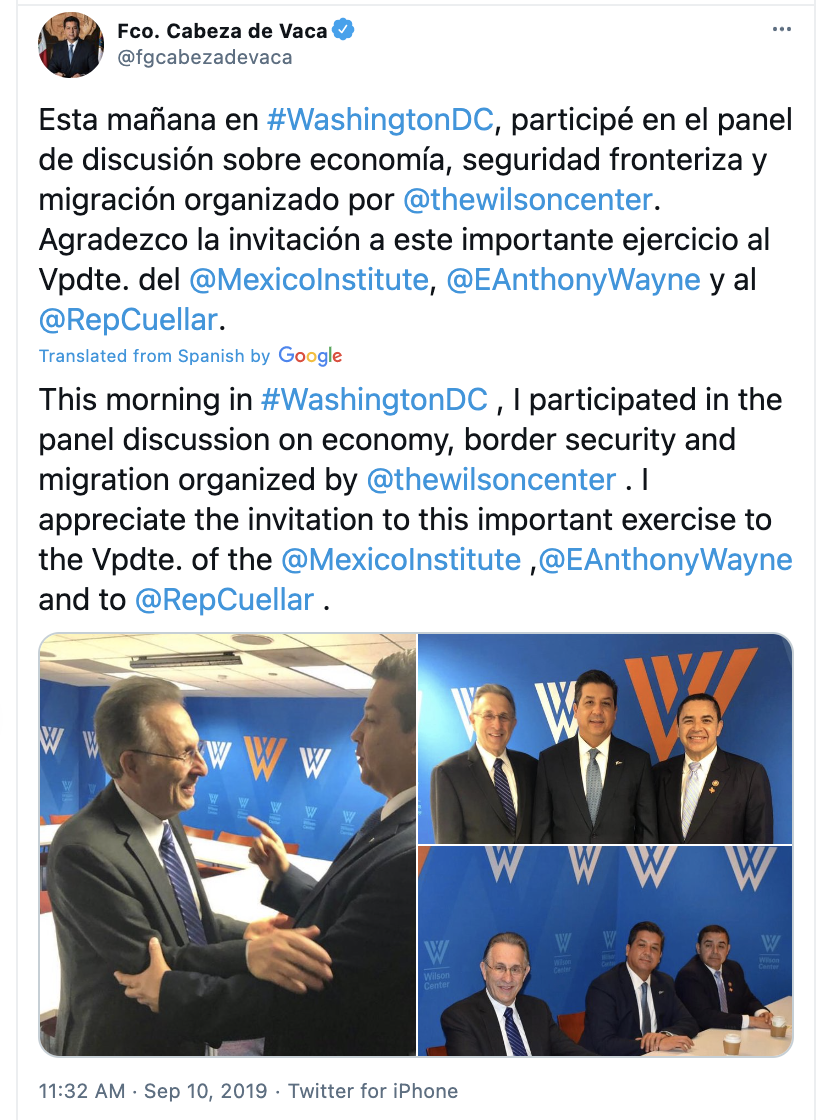
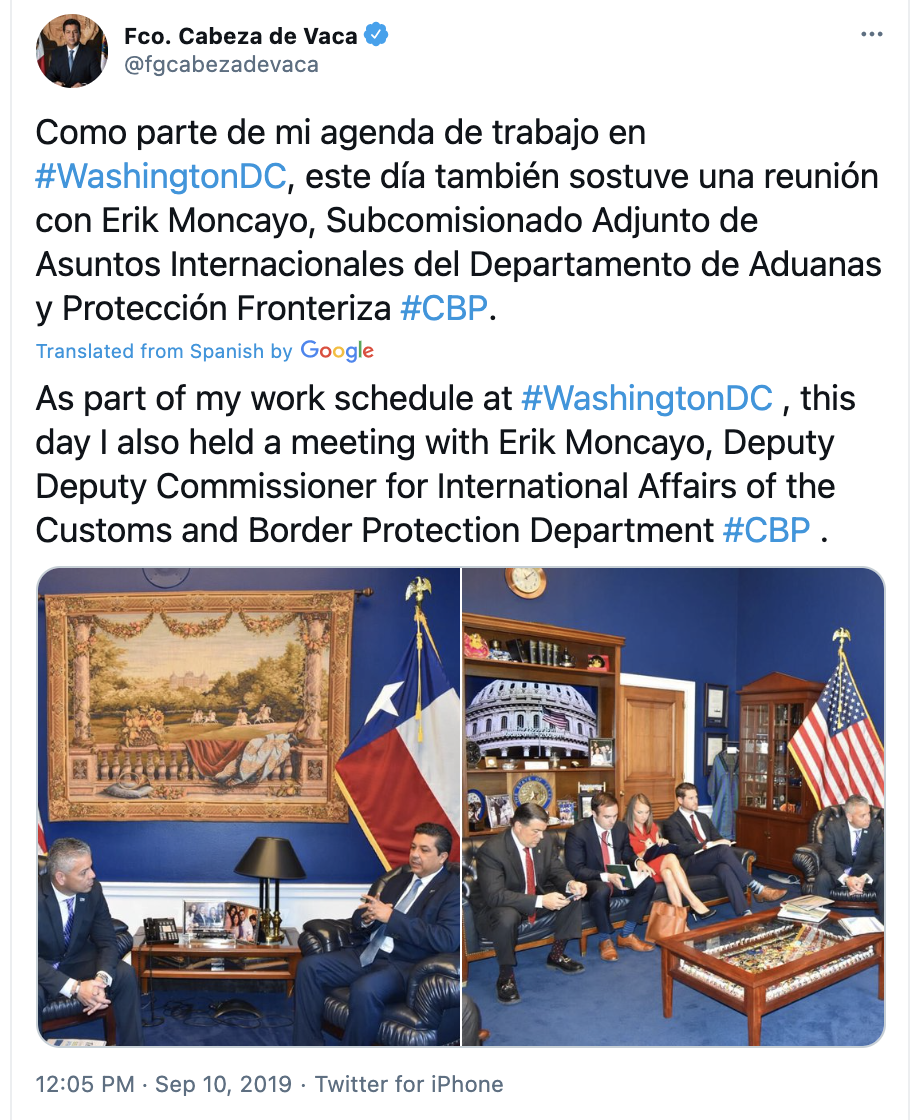
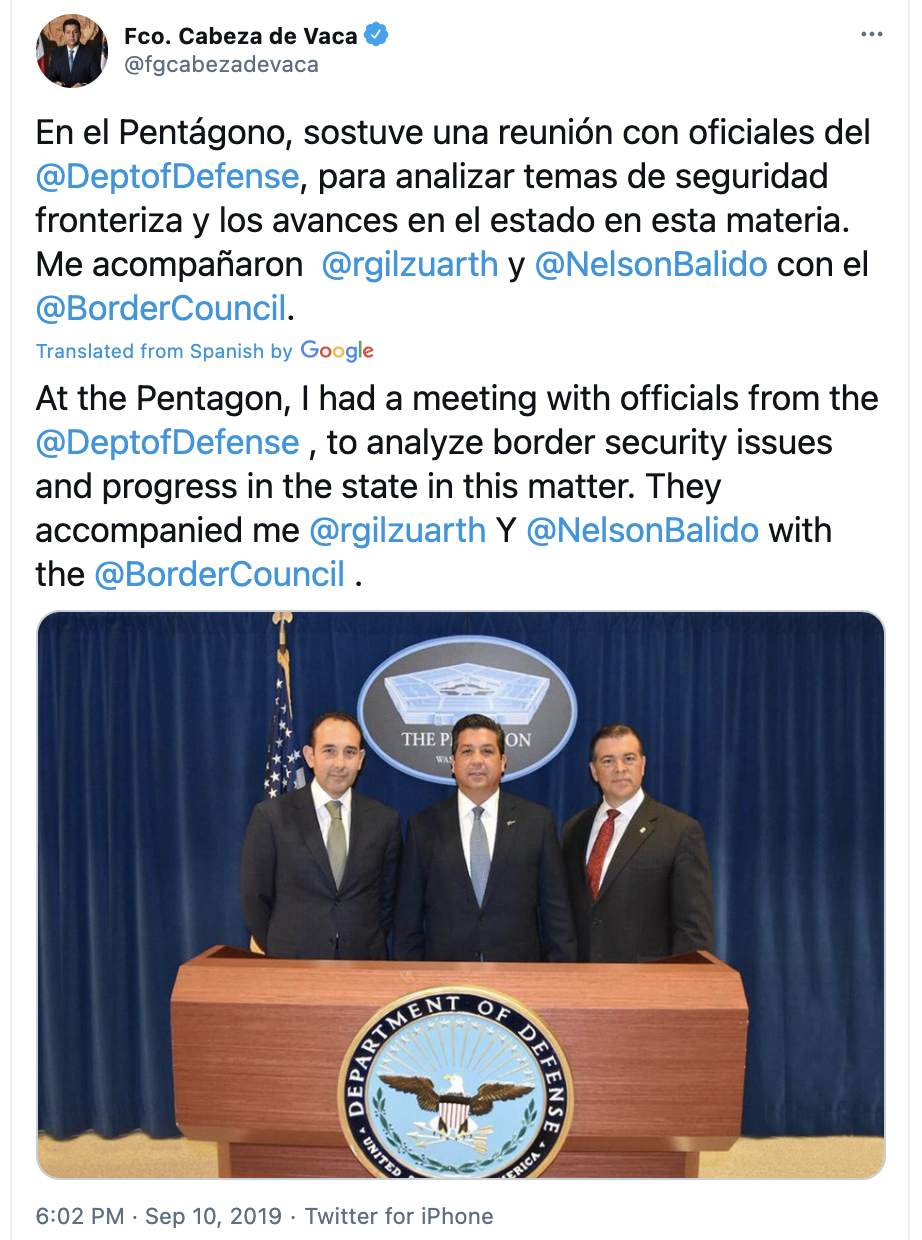
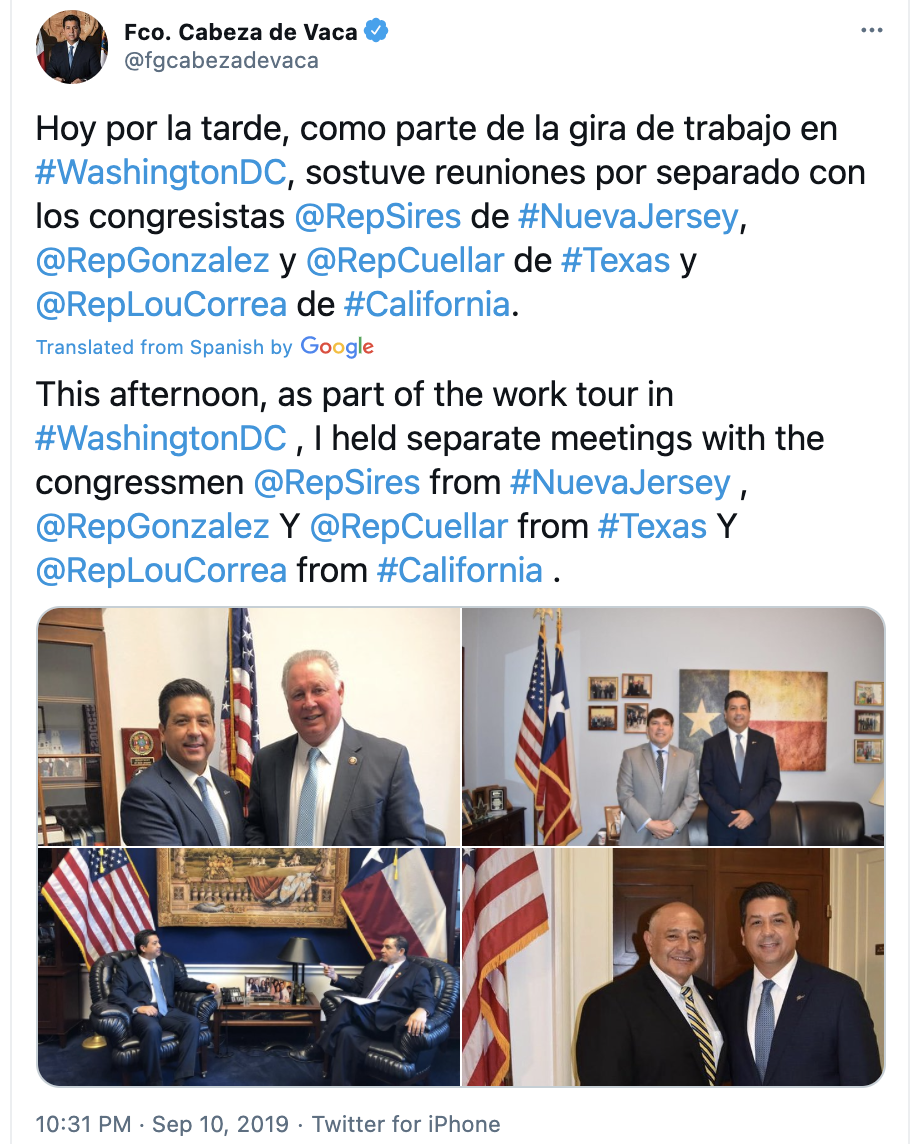
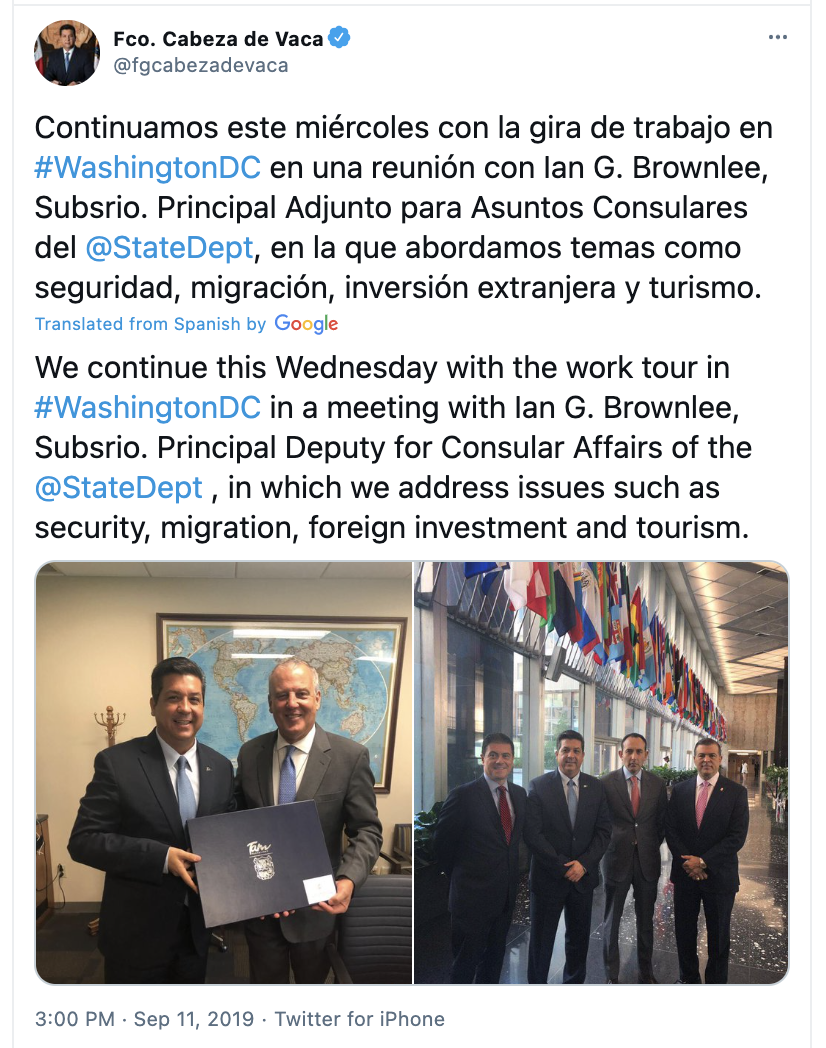
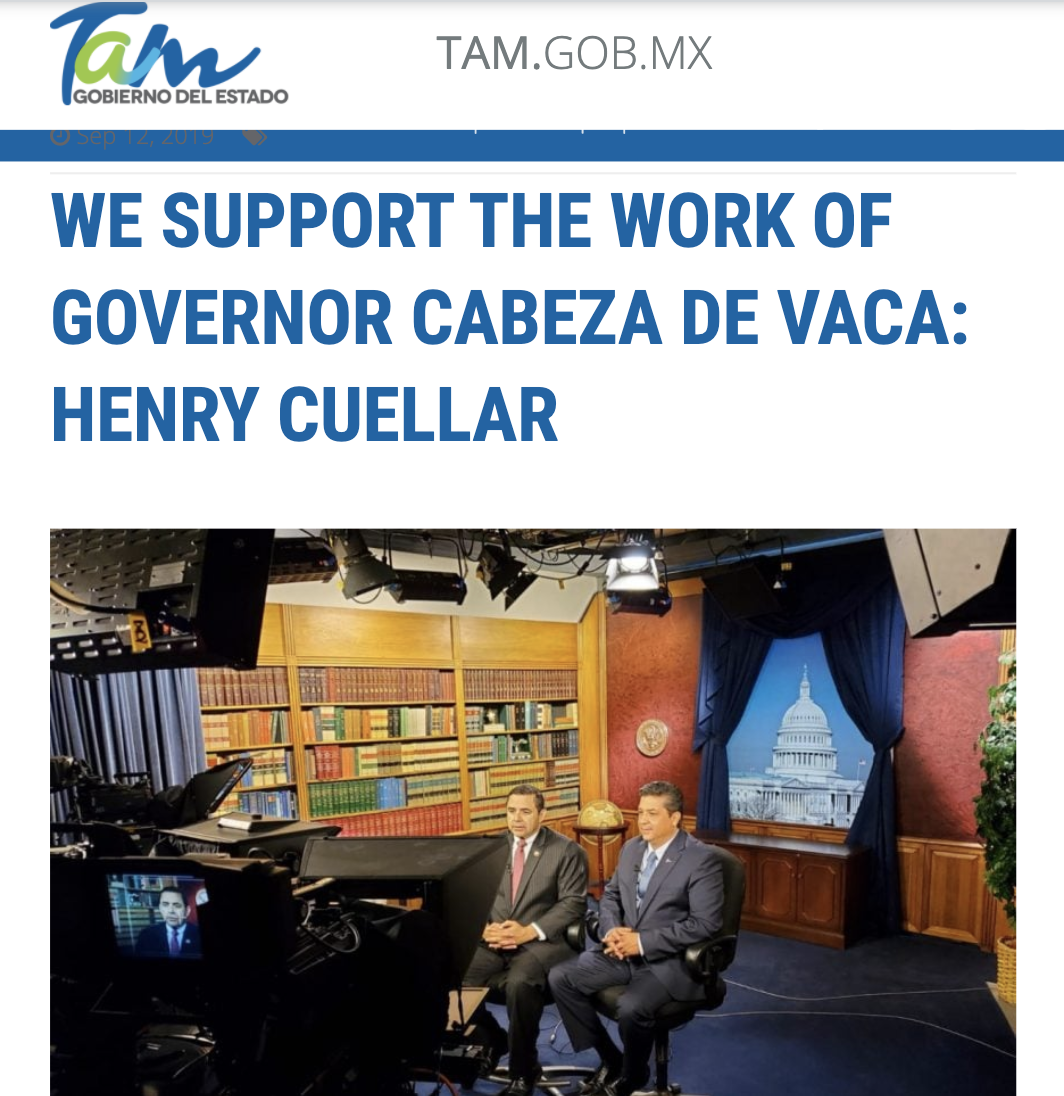
But behind that facade of respectability is a deeply corrupt state administration and a brutal police force that murders and lies as a matter of course. Cabeza de Vaca's trip to Washington was only days after the U.S.-trained special forces police unit that reports directly to the Tamaulipas governor, CAIET, executed 8 people on September 5.
One of those people was Jennifer Romero, a 21-year-old student with no criminal record.

Jennifer was two months pregnant and had come to Nuevo Laredo with her boyfriend three days earlier. On September 5, 2019, she had the misfortune of being in a house suspected of involvement in criminal activity when CAIET kicked in the door and took everyone they found inside into custody.
[CONTENT WARNING - GRAPHIC PHOTOS]
Police detained Jennifer and 7 others, and drove them to the western outskirts of Nuevo Laredo to a housing project in the Valles de Anahuac neighborhood where they were beaten, forced to dress in military fatigues to look like sicarios, and executed with a single shot to the head at locations in and around the house.
CAIET placed weapons near the bodies to appear as if they had died in a gunfight and the bodies were photographed and the photos were leaked to anonymous "citizen journalists" like the ones paid by Breitbart for distribution on social media.
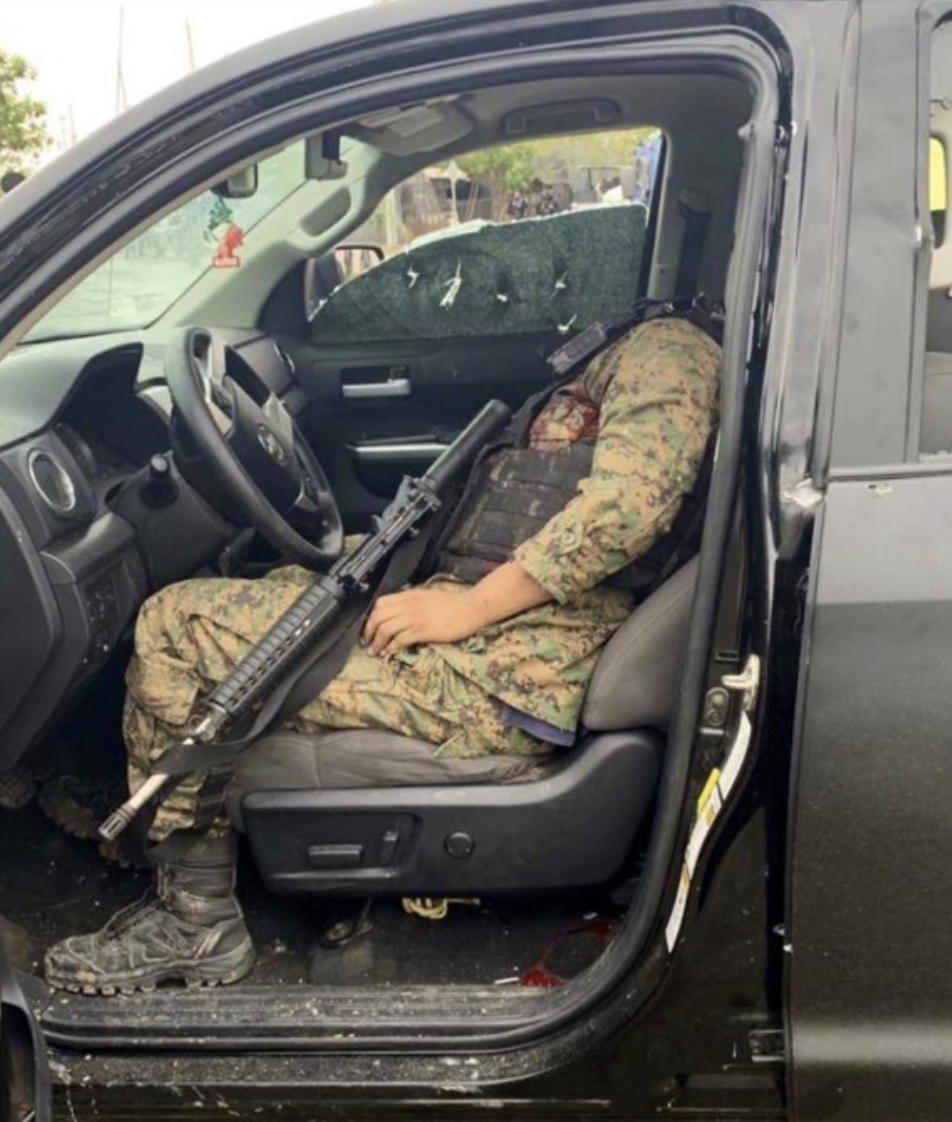
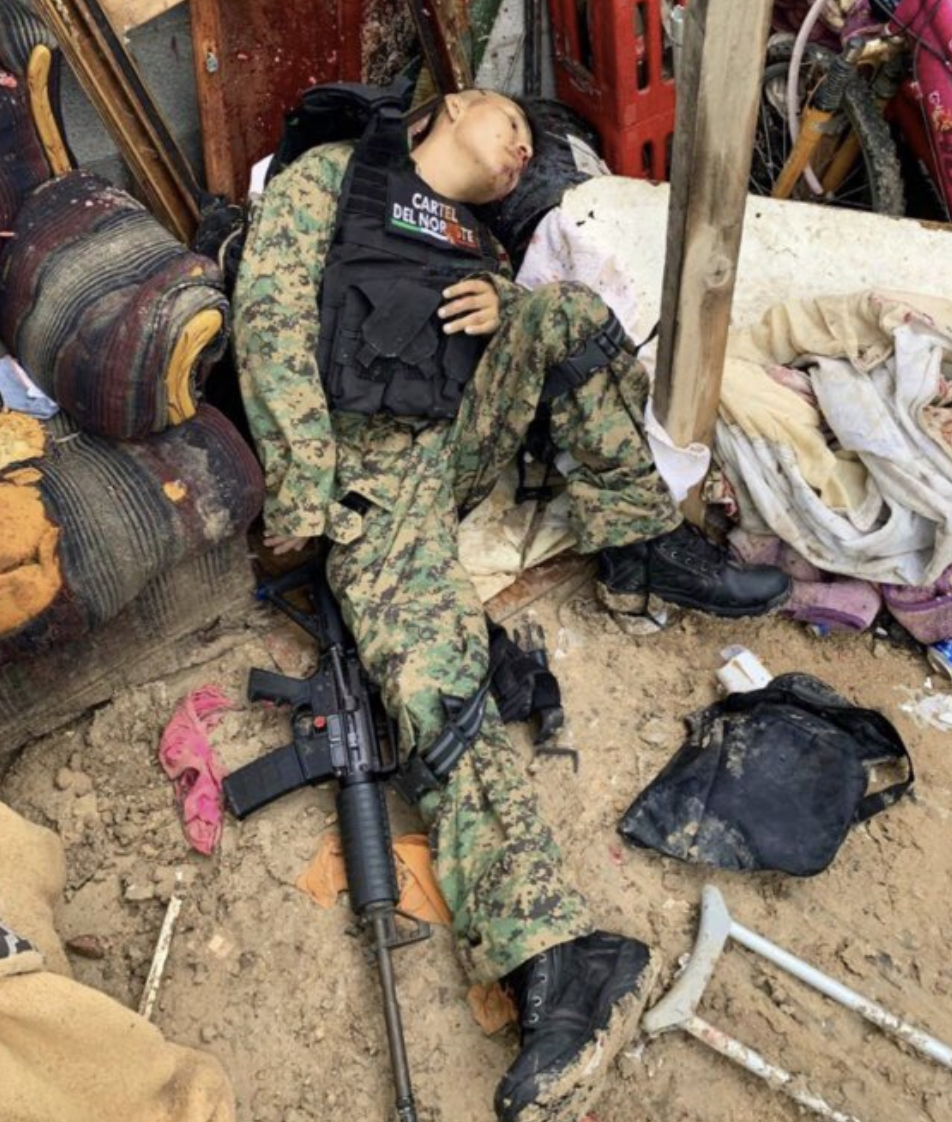
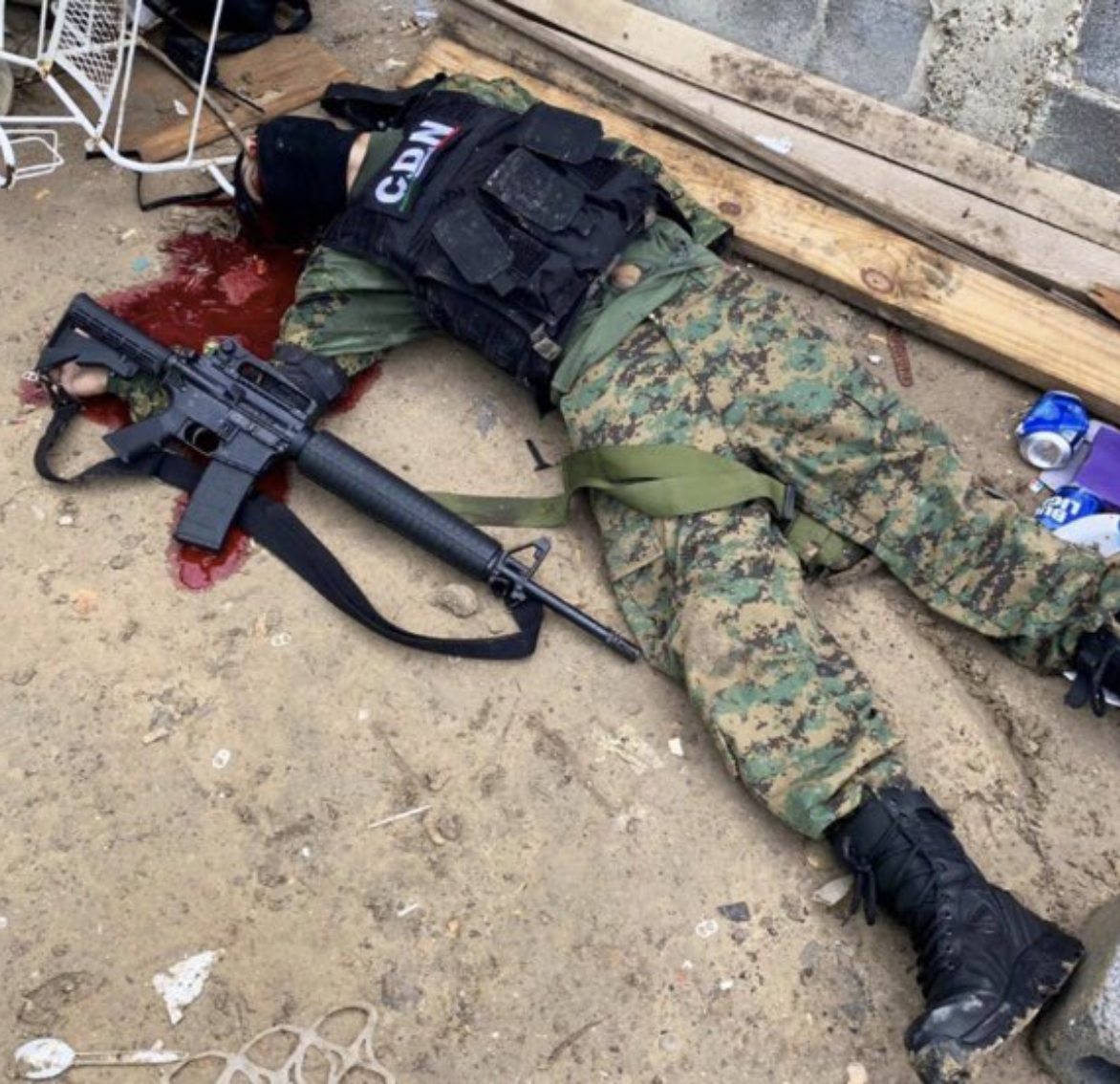
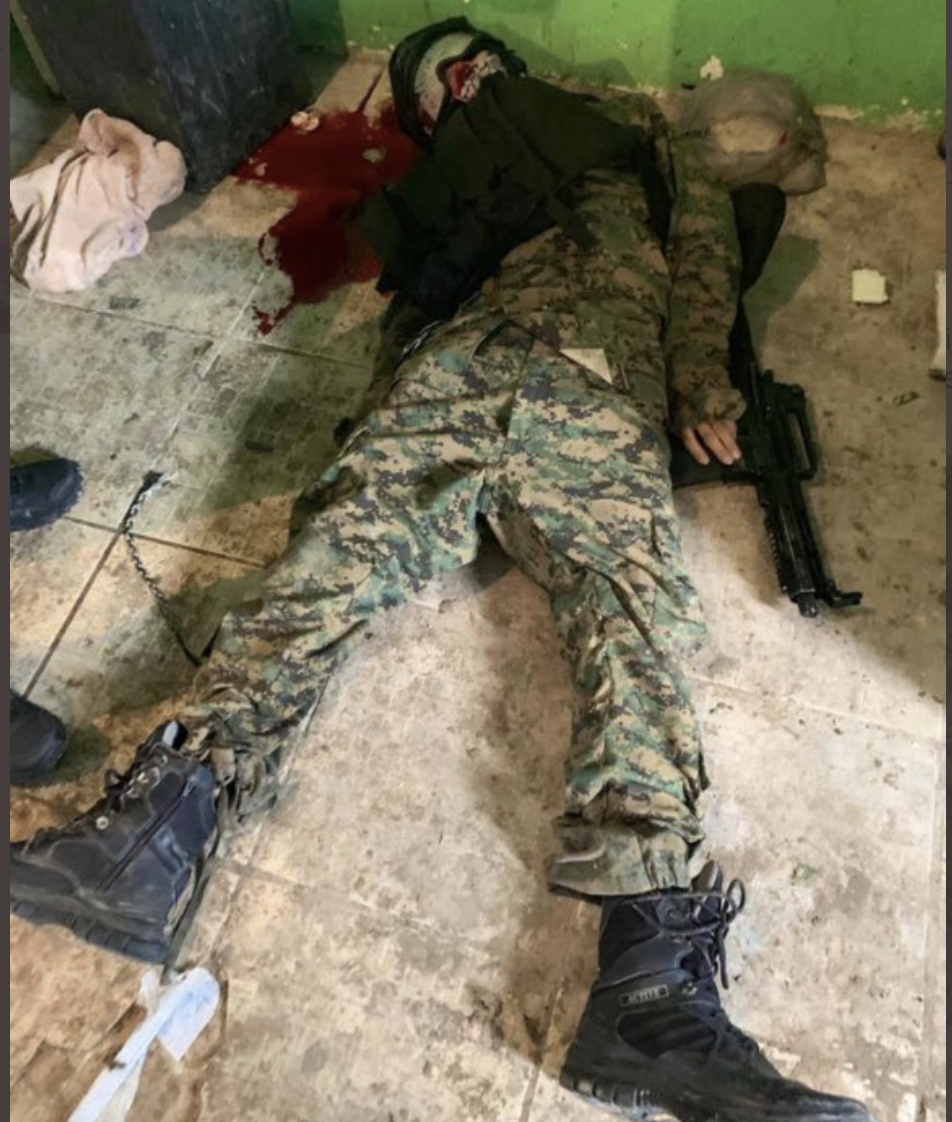
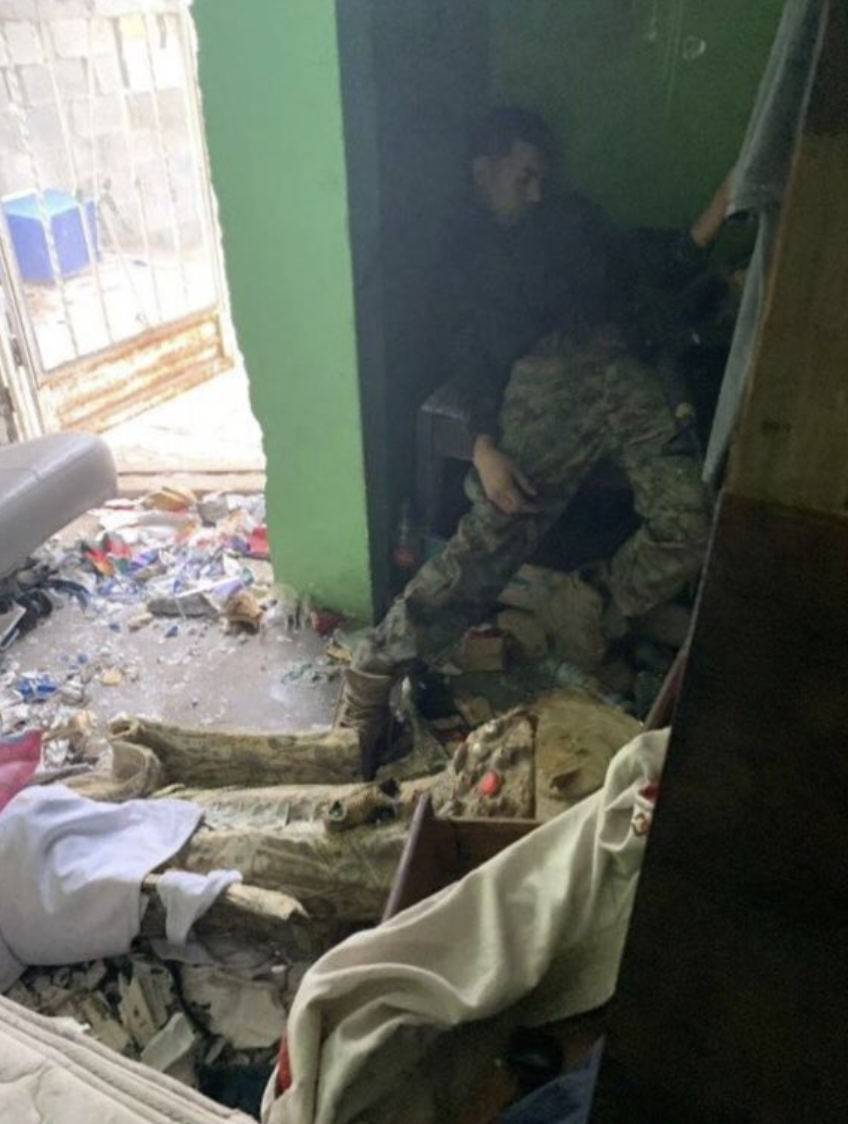
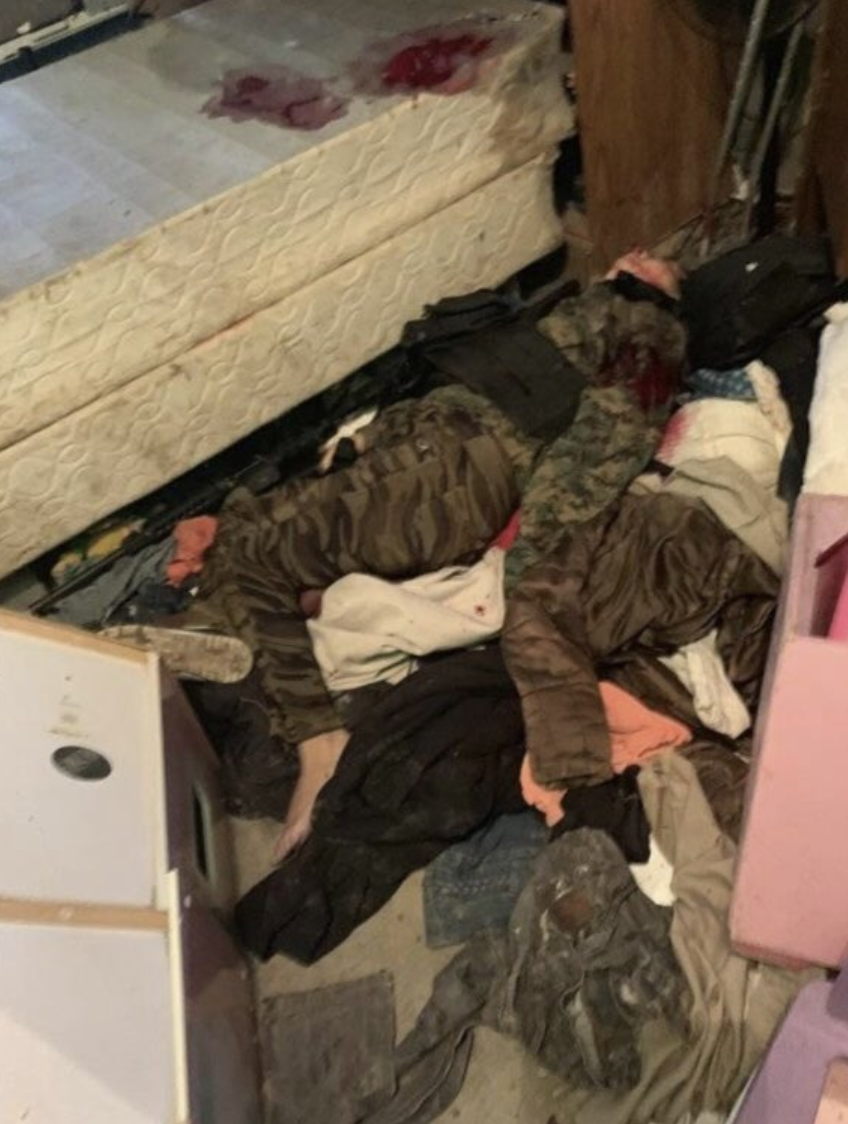
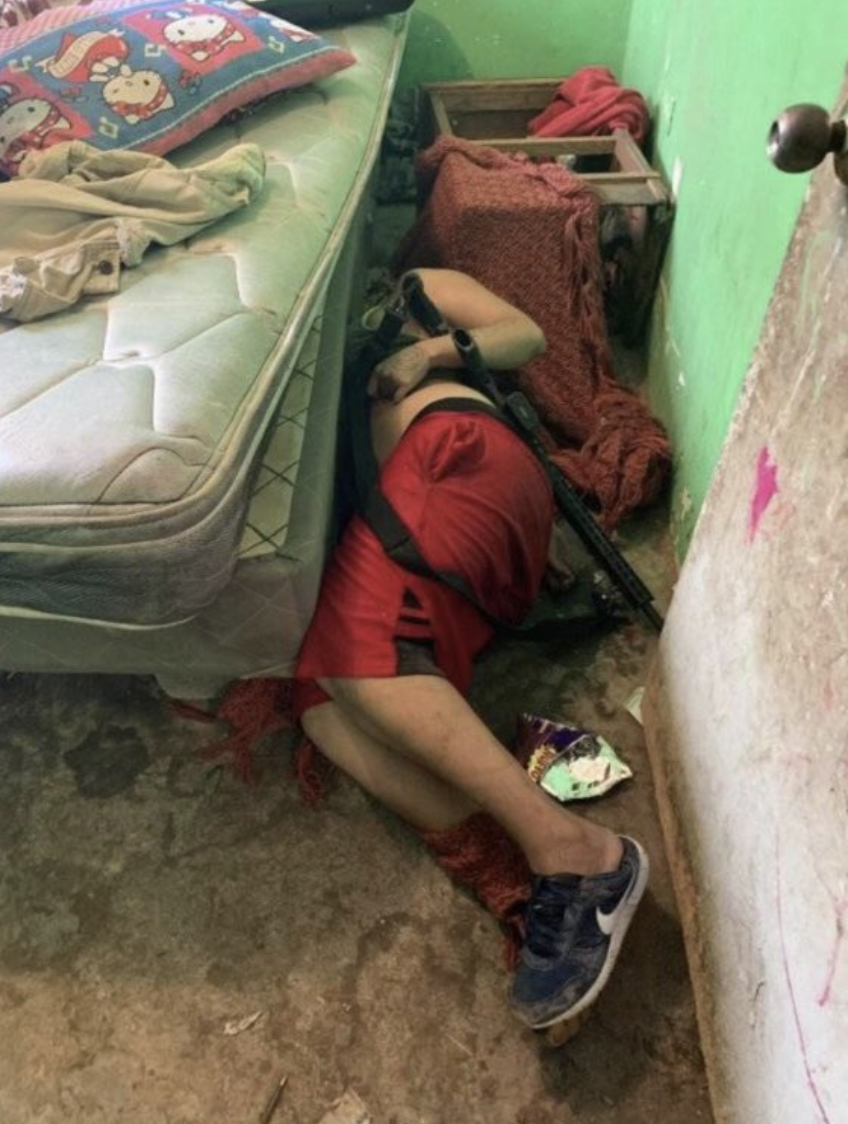
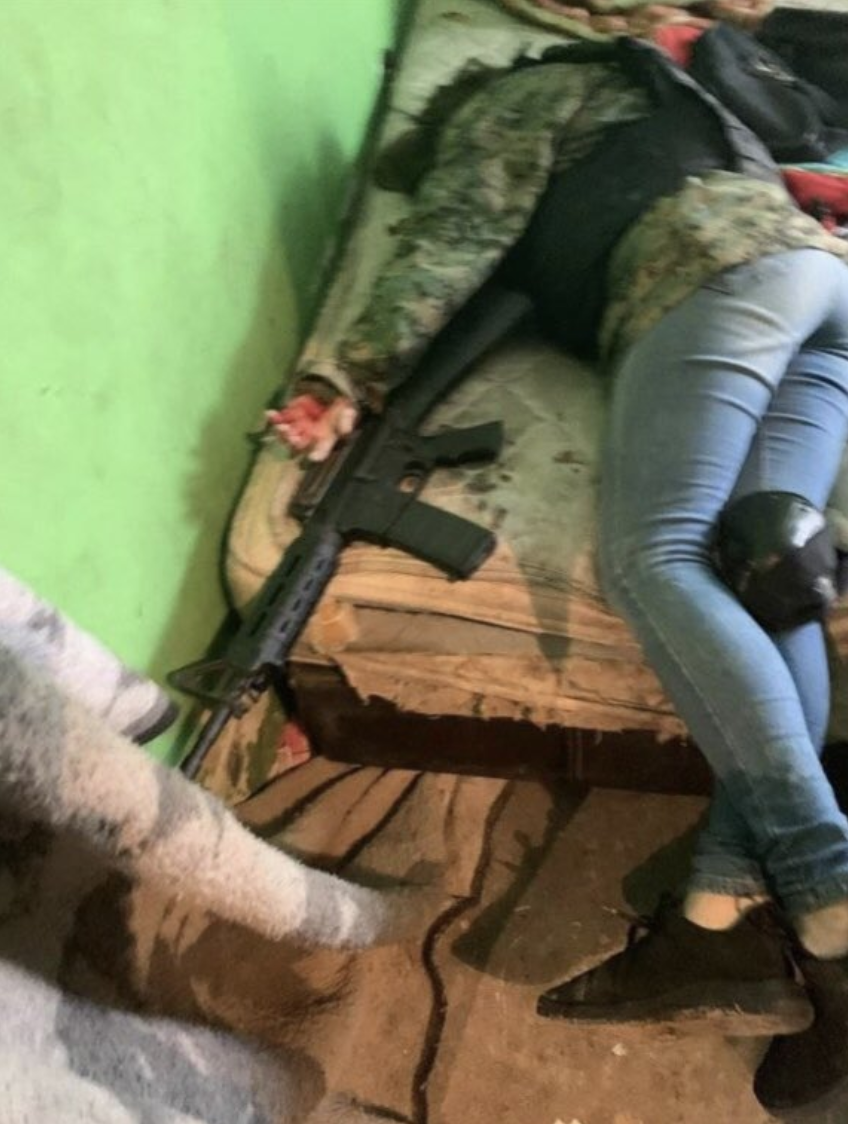
The police even towed an armored truck to the crime scene in broad daylight to corroborate their account.

"SICARIOS FROM THE CDN TROOPS OF HELL RECLAIMED BY SATAN," were how the executions were initially portrayed on social media. "An aggression, neutralized."
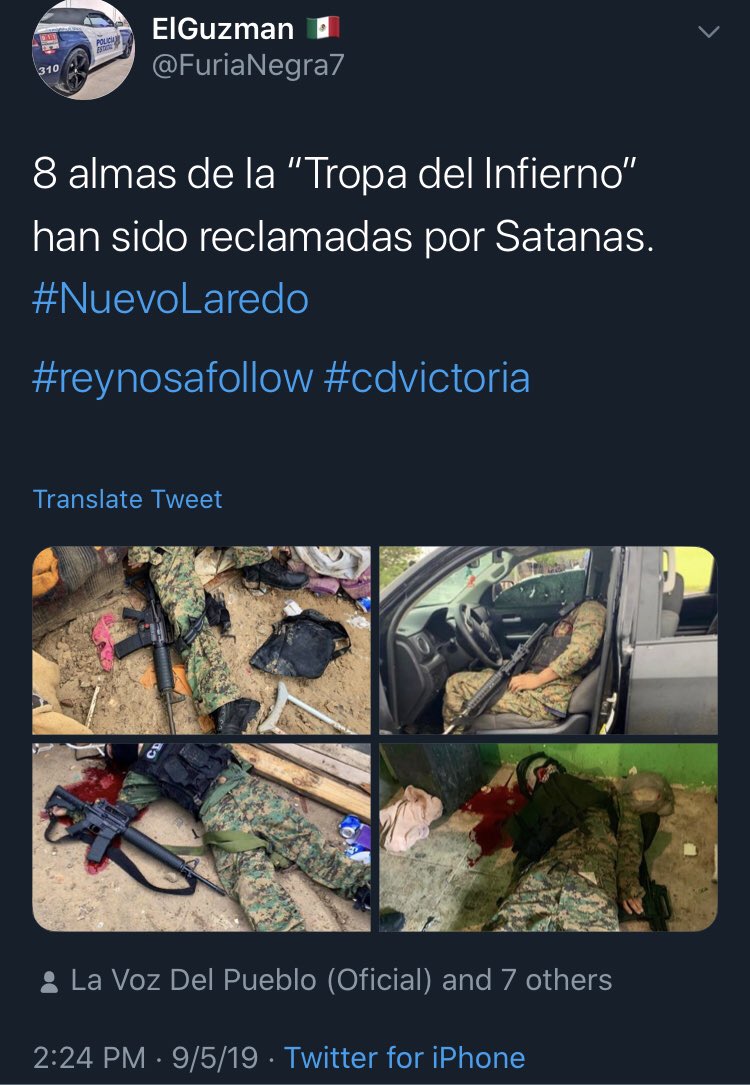
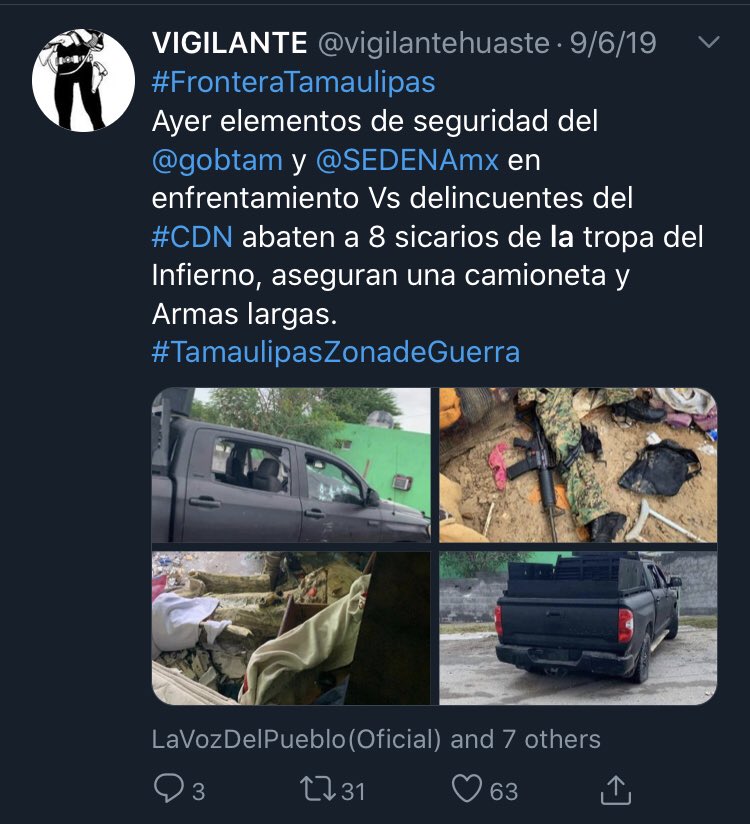
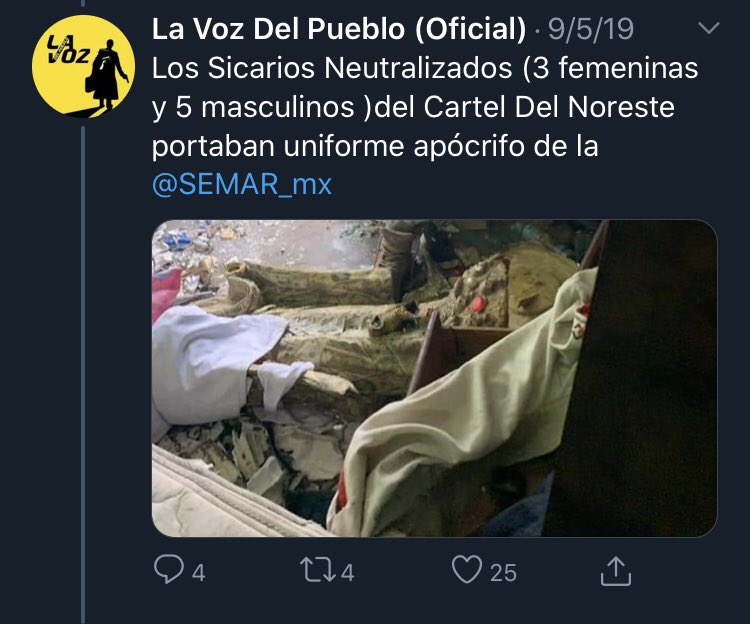
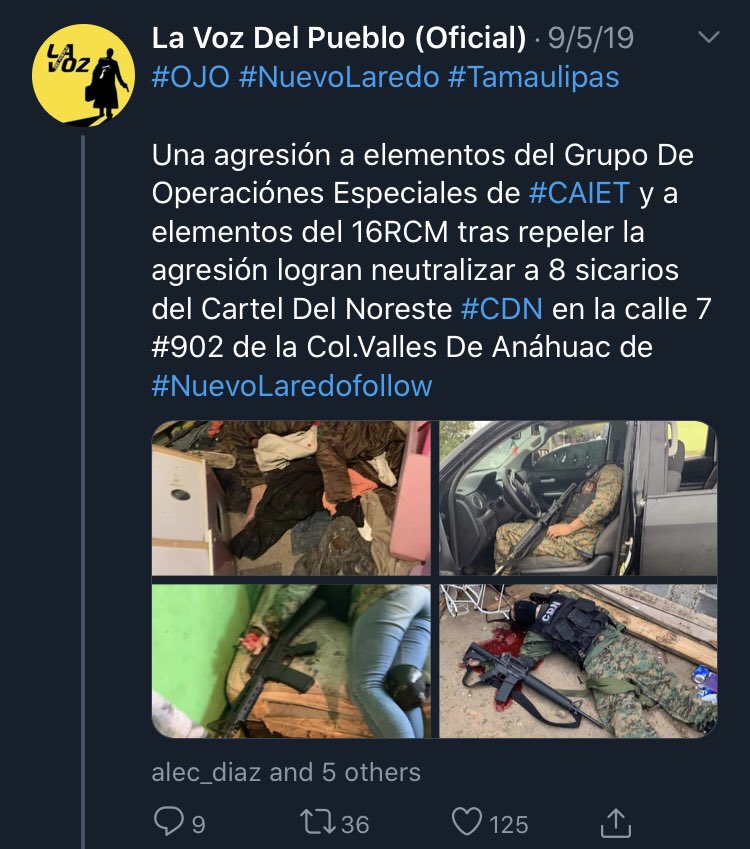
The malicious lie that allows the state to violate the human rights of both criminals and innocent people is that the violence only happens to criminals, or it is just criminals killing each other, a settling of accounts. But it is a myth. The truth is that the violence is just ignored and accepted as the sad reality of Mexico.
On September 10, 2019, shortly before the first stories in the press detailing what actually happened were published, Stratfor wrote a piece in Business Insider about the incident. The headline: "Gun battles on the border with the US show how deeply cartels have embedded themselves in Mexico."
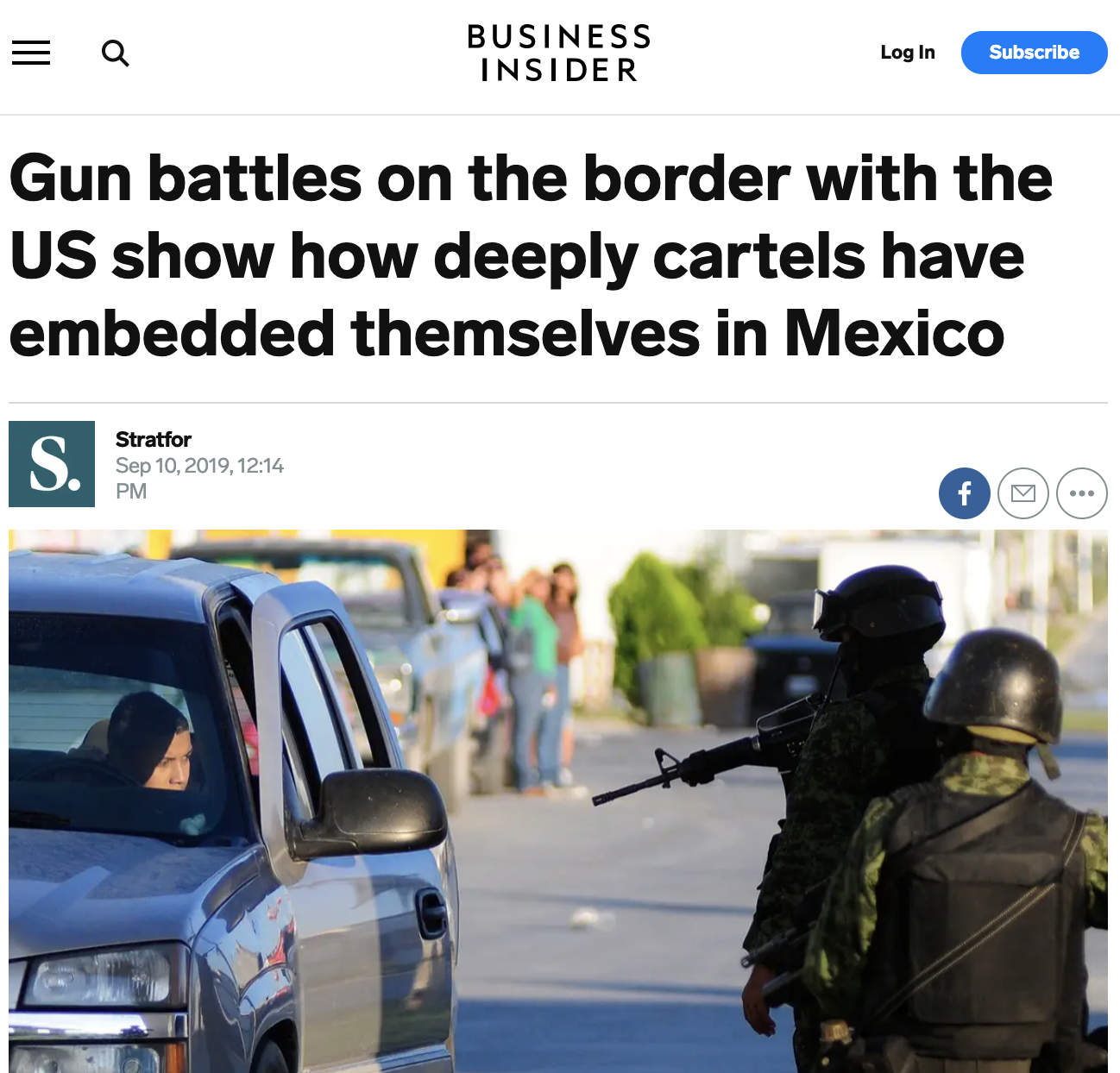
Epilogue
Less than a month after the atrocity and Cabeza de Vaca's trip to Washington, U.S. officials held a ceremony with the governor of Tamaulipas to announce the re-launching of the Se Busca Información initiative.

The extrajudicial killings barely registered in the U.S. media, which rationalized the executions by emphasizing that the police claimed that some of the victims were suspected of being involved with a drug trafficking gang.
After the executions, CAIET changed their name to GOPES (Grupo de Operaciónes Especiales) while retaining the same leadership and the same agents minus the few that were eventually charged for the executions.
In an interview published in Milenio in August 2020, CAIET Director Felix Arturo Rodriguez explained that the GOPES had originally been trained by the Mexican Navy (SEMAR) and U.S. law enforcement agencies.

In October 2020, Congressman Henry Cuellar and officials from the State Department and various DHS agencies attended a ribbon-cutting ceremony for a new police facility in Reynosa that the GOPES would use as one of their two bases of operations.

On January 22, 2021, three months after the dedication, members of the GOPES and Tamaulipas state police operating out of the new facility in Reynosa killed 19 people, 16 of them innocent Guatemalan migrants. Many of bodies were burned beyond recognition.

On February 7, Jorge Monroy reported in El Economista that the United States Embassy in Mexico acknowledged that three of the GOPES charged with the massacre were vetted and trained in human rights by the U.S. in 2016 and 2017.
Dedicated to JoeRooms, Valor Tamulipeco, Jorge A. Perez, Oswaldo Zavala, Dawn Paley and everyone else working on the behalf of truth.
With gratitude,
El Parece
